#asksfullofsugar
Explore tagged Tumblr posts
Note
Hi! Where do you think Alastor's arc is going? Redemption or villainy?
Hi!
Thank you for the ask, I loved watching Hazbin Hotel and I am happy I can write for the series :)
As for now, I think Alastor will spiral and hurt Charlie very badly, but he will eventually redeem himself (probably in a key moment). That is because Alastor is framed as Charlie's Jungian shadow.
What is the Jungian Shadow?
According to Jung, the shadow is what a person represses, both positive and negative. So, it can be one's violent tendencies, but also one's potential and energy. It really depends on the person.
So, why does Alastor fit the Shadow Archetype? Well, first of all:
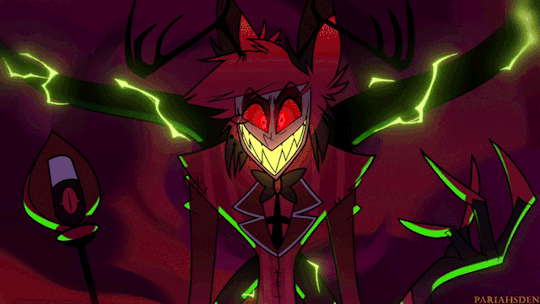
Alastor's powers make use of shadows. Not only that, but Alastor's own shadow is very expressive and shows the demon's repressed feelings. In other words:
On the one hand Alastor embodies the shadow, in the sense he represents what Charlie refuses to face
On the other hand Alastor himself represses his emotions behind a smiling face:
Alastor: Just because you see a smile, don't think you know what is going on underneath. A smile is a valuable tool, my dear. It inspires your friends, keeps your enemies guessing and ensures tha no matter what comes your way, you're the one in control.
This is a good characterization for a jungian shadow because the shadow grows stronger and more dangerous, when it's ignored. So, the most one refuses to face their feelings, the most these feelings fester and grow powerful and dangerous. This fits Alastor both when it comes to others and to his own character:
He takes advantage of an emotional unstable and vulnerable Charlie to strike an abimguous deal with her. Similarly, he uses Husk's gambling addiction to steal his soul. He uses people's weaknesses an unsolved problems to take over.
He suffocates his feelings, which symbolically manifest in his powerful shadow-tentacles. His design and abilities are representative of his psychological coping mechanism, which is nothing, but repression.
As written above, though, the Jungian Shadow can be both negative and positive depending on what one hides. This duality is shown in Alastor's two roles in Charlie's arc:
He is a demonic archetype (even moreso than Lucifer, the titular devil), as he waits in the shadows for a chance to manipulate Charlie
He is an evil mentor, as he genuinelly likes Charlie, sees her potential and wants to guide her towards greatness:
She's filled with potential that I could guide
This isn't a contradiction, but complexity. Alastor is chaotic and mixes negative traits and intentions with positive ones. Just like what people repress can be both bad and good, usually at the same time.
This is clear when it comes to the Princess of Hell:

Charlie to Alastor: What's that you said about smiles?
Charlie is similar to Alastor in how she represses herself behind her pollyanna persona and her smile. This doesn't mean she is faking her altruism and generosity, but that she is using these traits to hide something else:
Lute: The only reason you're still here is that Daddy gave you and your Hellborn-kind a pardon from an exorcist's blade. How does that feel? To know how little you matter.
Deep down, Charlie invests herself in the Hazbin Hotel project because she wants to matter. She feels powerless and unimportant, as a result of her parents' neglects and of Hell's difficult situation.
So, our protagonist has strong self-issues that she refuses to face:
Husk: Princess is a bleedy heart who wants to solve everybod else's problems, 'cept her own.
That said, this isn't the only thing Charlie represses. The Princess of Hell hides:
Every negative emotions she feels, like her self-hate or her anger at Vaggie for hiding her true identity:
Rosie: How does that make you feel? Charlie: Just... angry? Because we share everything! Because she always supported me, and my ideas, and now I don't know whether or not that was just more of the lies... Oh no, that's a horrible thing to think! Do I think that? Yes! No? Kinda?
Her most violent and aggressive side, which makes so she is unable to make full use of her powers:
Vaggie: Well, I mean... You're the princess of Hell, but you don't really use the power that comes with that. Mybe you can, I don't know? Command a little more... authority. Charlie: But that's so mean.
In short, by repressing her negative feelings, she also represses her potential. It is only by facing herself as a whole, that she can fully grow and bloom into her most powerful and complete self:
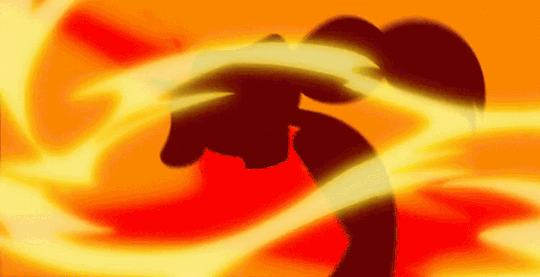
This is made clear in Charlie's quest in Cannibal Town. There, our girl is at her lowest, but she is pushing herself forward for the sake of her loved ones. She is trying to imitate Alastor by smiling, even if she is sour inside. However, things do not go well and it is only through her heart to heart chat with Rosie, that Charlie is able to pull herself together and inspire her people. Symbolically, she gets through them not with a 100% optimistic song like "Inside of every demon is a rainbow". Rather she opens her speech, by showing vulnerability and honesty:
It's a feeling like a rumbling in your gut That you could finally be faced with A billion needy faces I guess what I mean to say is For the first time in my life I might have to be ready for this Ready to be the one who's leading from the front Gotta come into my own Gotta come into my throne Gotta take charge and defend my only home And although I kinda feel unsteady Now I need to be ready for this
She affirms who she is and her willingness to grow into herself:
For the first time in my life Maybe I can be ready for this I can be the marshal leading the parade I can come into my own And I think I've always known My destiny could never be postponed When Adam brings the battle here I must appear like I'm ready for this
So, it is only by tapping into her own shadow that Charlie can be successfull. It is through expression and not repression that she can reach her goals.
What about Alastor?
He is the same, but so far he has been refusing to open up to others:
Angel: He's been here a while and he's still a big, creepy mystery.
That said, his time at the Hazbin Hotel has had an impact on him. He is forced to deal with others without killing them:
Vaggie: Pentious's eggs are all over the place. I need you to get rid of them. (...) Humanely!
He is shown cutting ties with a poisonous friend:
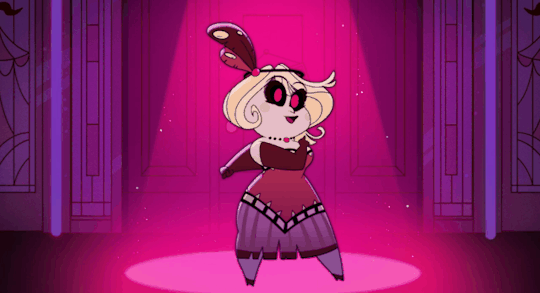
He openly admits he likes the people of the hotel:
Alastor: Ah, an enjoyable collective to be around. I admit one could get accustomed.
However, he still refuses to openly show vulnerability and ends up like this:
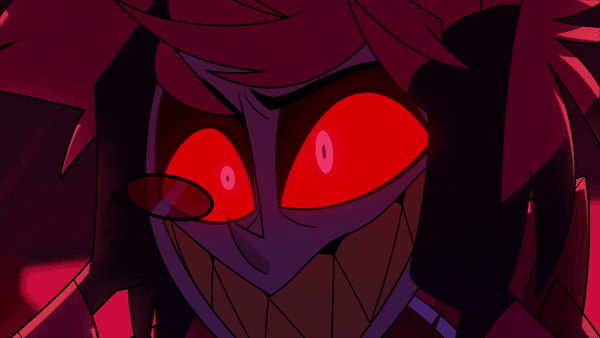
Let's highlight that Charlie and Alastor are foiled in The Show Must Go On song.
Both stand in the ruins of their homes/dreams.
The Hotel:
I took a hotel, and I destroyed it I know I could have done better Better, instead of letting you down
The Radio Station:
This place reeks of death There's a chill in the air And I barely escaped being killed by a hair
And both decide not to give up and to keep pursuing their objectives. However, Charlie is framed positively, while Alastor negatively. Why?
Charlie sings about her feelings openly and is supported by her father and found family:
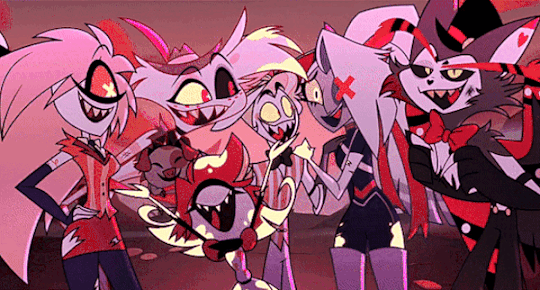
Alastor sings about his pain privately and even then he barely shows his desperation before going back to his villanious mask:

Symbolically the moment Alastor reunites with the Hotel Crew, he sings:
And we're doing it with a smile!
He is back in control of himself, ready to hide everything behind his neverchanging smile.
So, Alastor is both Charlie's negative foil and Jungian Shadow. As her negative foil, he is bound to spiral. As her Jungian Shadow he is bound to be saved. Why is that so? Two reasons.
The Jungian Shadow can't be killed, but needs to be integrated with.
The main themes of the series are redemption and love, so it is improbable that Charlie won't help the person, who co-founded the hotel with her.
If anything, it seems that our princess is progressively asked to forgive, inspire and see the good in more and more complex cases.
It starts with Angel, who willingly stays at the Hotel. It goes on with Pentious, who infiltrates the Hotel, but makes no real damage. Then Lucifer, whom Charlie loves, but that has been absent from the majority of her life. Finally, Vaggie, who breaks Charlie's trust.
Each conflict Charlie has challenges her in a different way and helps her discover herself and grow. She is bound to meet new struggles when Lilith becomes a broken pedestal and finally when Alastor betrays or hurts her. Still, she is going to forgive and to understand them.
Charlie is going to see the good in Alastor and to better understand herself as a result. As a matter of fact Charlie's journey is one where she is slowly discovering a world, which isn't black and white:
If Hell is forever, then Heaven must be a lie If angels can do whatever, and remain in the sky The rules are shades of gray when you don't do as you say When you make the wretched suffer just to kill them again
Just like people aren't black and white. Just like she herself isn't black and white. By saving Alastor, she is gonna save herself too. Together with the whole universe.
And what about Alastor? Well, he needs to work on himself, as well. He too must integrate with his shadow, who is embodied by a certain character:
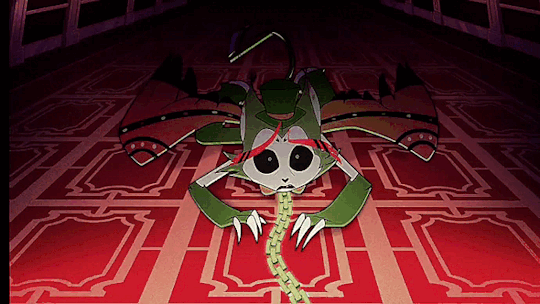
Husk is a powerful overlord, who lost his soul to a demon. Just like Alastor:
Husk: Big talk for someone, who's also on a leash.
Alastor and Husk are both on a leash. Still, Husk admits it and starts working on his shortcoming:
Husk: You're a loser, just like me
Alastor instead affirms his willingness to be in control and to pull the strings:
Once I figure out how to unclip my wings Guess who will be pulling all the strings?
Alastor is a loser, just like Husk. Just like all the characters in hell. Sinners vs Winners. And yet, he refuses to admit it. This is why he makes no progress. Similarly, he wants freedom, but enslaves others. This isn't going to work out, which is why I am fairly certain he will eventually set Husk free. Probably by doing so, Alastor will make the first real step towards his own freedom. He will start integrating his own shadow.
Thank you for the ask!
#hazbin hotel#hazbin hotel meta#alastor#hazbin hotel alastor#charlie morningstar#my meta#asksfullofsugar#anonymous
457 notes
·
View notes
Note
Hi
A lot of people keep saying Sera from Hazbin hotel and Satan from Helluva Boss are quite similar of how they run Heaven and Hell and personality wise. Would it be possible if you can do an analysis of how similar they are and how heaven and hell isn’t much different from Sera and Satan running both places.
Hi!
Sorry for the wait and thank you for the ask because I have been wanting to discuss this since the episode first came out!
SERA AND SATAN: KNOWLEDGE AND JUSTICE

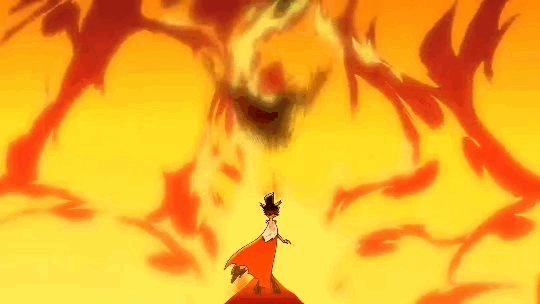
Sera and Satan are superficially opposites:
Sera is an angel, who presents herself as virtuous, merciful and understanding. She is polite towards Charlie and acts as if she is gonna judge her Hazbin Hotel idea fairly.
Satan is a demon, who presents himself as strict, violent and scary. He is dismissive towards I.M.P., openly racist and all he wants is to find someone to punish.
However, neither is exactly what they seem, as both are wearing a facade.
Sera isn't interested in hearing Charlie out. She manipulates events, so that the Princess of Hell has no chance of succeeding. Moreover, she uses Adam's malice to present him as Charlie's opponent, when she is the one getting in the way. In other words, Sera is the mastermind behind Charlie's failure.
Satan isn't really that much in control. He is easily manipulated by different people, as Andrealphus, Blitz and Stolas all trick him. Moreover, he can't really hide the growing tension among the Sins, no matter how much he tries. In other words, Satan is really no mastermind nor leader of Hell.
What is the point of Sera and Satan both wearing masks?
Both Sera and Satan try to fit the role of leader they are given. Sera is the High Seraphim of Heaven, so she must be perfect and rightful. Satan is instead the Leader of the Deadly Sins, so he must command respect and instill fear.
Most of all, Sera and Satan believe Heaven and Hell can keep going only if the status quo is uphold.
This idea permeates all their actions, including their role as judges. Sera is in charge of a "questioning", whereas Satan presides a "trial". However, neither of them is a good fit.
A questioning is about knowledge. It is about questioning the status quo to discover if there is a new way to do things. It is about pursuing truth and understanding. Still, Sera herself has knowledge she doesn't disclose:
Lute: SHHH. Sir, what was the Seraphim's one rule? Adam: Uuughhh, "No one but the exorcists can know about the exterminations". I know, fine.
Not only that, but she doesn't want the other angels to ask difficult questions:
Sera: This questioning stops now. We know when a soul arrives, we know when they pass divine judgment, it is our job to ensure these souls are safe.
She uses ignorance as a weapon to keep the system in place.
A trial is about justice. It is about judging if a person is guilty or innocent. It is about giving retributions, which are proportionate and fair. However, Satan is "accuser", as his name implies, "jury", as he manipulates the other demons' votes:
Satan: Why don't we take a vote. Who wants to listen to hours of testimony? Who wants to kill this imp bastard and get home for lunch?
And "judge", as he makes the final decision:
Satan: So you see Next to me, your master plans all look so small Little mice When you break my rules You pay the price!
He embodies a draconian law system. In this sense, he himself is "the law". He is an unjust justice, which strikes fear in people.
Ignorance and fear are what Sera and Satan use to preserve things as they are. They do so because they both believe "order" is necessary to prevent chaos. And yet, both their authorities are challenged during "Welcome to Heaven" and "Mastermind". This happens because two characters choose to stand up against them.
EMILY AND STOLAS: UNDEXPECTED OPPONENTS
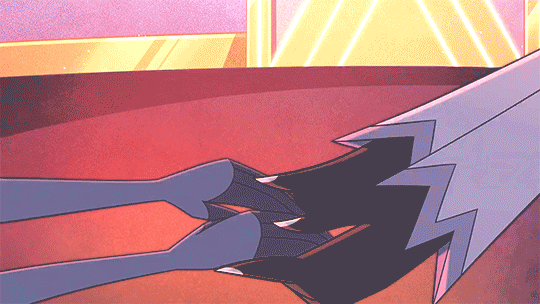

Emily and Stolas are respectively a Seraphim and a Goetia. So, they are members of the groups Sera and Satan are doing the interests of. In fact, both Emily and Stolas are powerful, sheltered and at the pinnacle of their respective hierarchies. All they have to do is to stay in their place to keep indulging in their privilege. And yet, both decide to side with respectively Charlie, a demon, and Blitz, an imp.
Emily, differently from Sera, is curious about Charlie's idea and she is interested in discovering the truth about how souls get to Heaven:
Emily: Yeah, why isn't he here?
She is genuinely pursuing knowledge and virtue:
Emily: To think that I admired you Well, I don't need your condescension I'm not a child to protect Was talk of virtue just pretension? Was I too naïve to expect you To heed the morals you're purveying?
Stolas, differently from Satan, doesn't want I.M.P. to die, so he uses the classist ideology Satan understands to manipulate him into showing mercy:
Stolas: I came down just as soon as I heard of the imp Stood accused of a devilish crime Could it be that a worm such as this half a brain Could concoct such a plot so sublime? Does this fool deserve the flame? Or is someone else to blame?
He is acting out of personal feelings, rather than political ideology. However, he is protecting lower demons at a high personal cost:
Stolas: I am the mastermind, the hand that holds the strings! No simple imp of mine could master the disaster Oh it stings! That you thought You had caught the schemer of the schemes I wrought! I confess! It was me and I have no regrets!
Emily and Stolas's "rebellion" is interesting for two reasons.
1) It leads to a moment in You Didn't Know and Mastermind, where Emily/Charlie (directly) and Stolas/Blitz (indirectly) challenge Heaven and Hell.
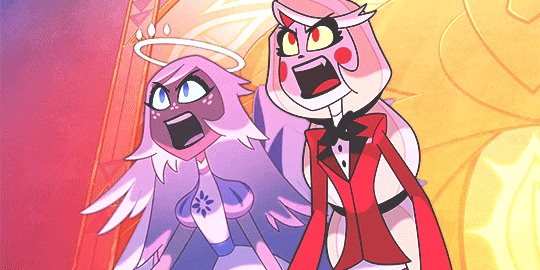
Charlie and Emily: If Hell is forever, then Heaven must be a lie If angels can do whatever, and remain in the sky The rules are shades of gray when you don't do as you say When you make the wretched suffer just to kill them again
Here Emily and Charlie have the higher moral ground over Sera, as they sing a reprise of Hell is Forever. They are calling out the High Seraphim of Heaven on her hypocrisy and daring to say Heaven itself is turning into Hell.
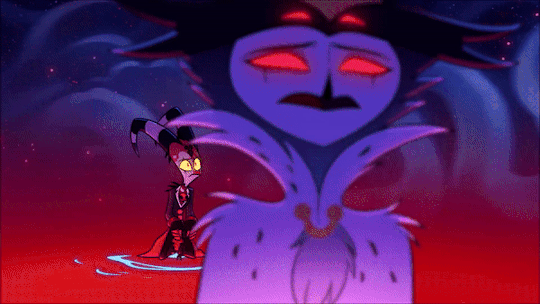
Stolas: You're my light Blitzo: You're my heart Blitzo and Stolas: Only death can rend our love apart!
Here Stolas and Blitz are having a metaphorical wedding. They affirm their love with a formula similar to "until death do us apart". Moreover, this exchange happens in front of the embodiment of law (Satan). Stolas and Blitz's relationship is symbolically disrupting the balance between the higher class and the lower demons. They are challenging Hell's bigoted views.
2) It forces Sera and Satan to deal with Emily and Stolas's resistance.
On the one hand Sera insists Emily should ignore what just happened and keep going with the duty Heaven assigned her. She tries to enforce "ignorance" on Emily:
Sera: It is my position as the head Seraphim to protect our people at all costs. And it's your position to keep them happy and joyful. Emily: How can I bring joy when I now know we are bringing misery to thousands of innocent people?
On the other hand Satan makes an example out of Stolas, so that none of the other Goetia will dare to challenge the status quo. He "frightens" the rest of Hell with Stolas's punishment:
Satan: No. Ooh, ooh. No, no. You still definitely fucked up, we just need to figure out a fitting punishment for you.
What's interesting is that both Sera (directly) and Satan (indirectly) compare Emily and Stolas to Lucifer:
Sera: Please.... if you start to question... you could end up like Lucifer: Fallen. I couldn't bear to see you suffer that fate, so please, let me worry about this, ok?
Sera does not want Emily to end up fallen, like Lucifer.
Satan: STOLAS! I hereby strip you of your status, your power, and your title for the next hundred years. You will have to live amongst the citizens of Hell and revel in your failings!
Satan banishes Stolas, just like Heaven banished Lucifer.
Why is the fallen angel so important?
LUCIFER'S FAILURE

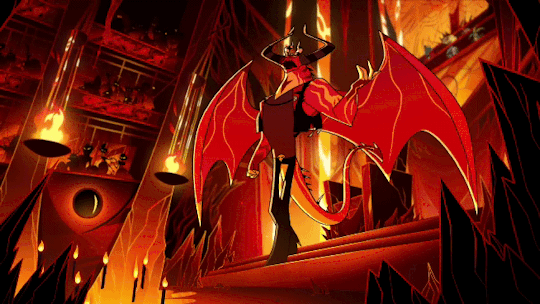
Sera: Well, you failed to control the demons' unrest, and now Lucifer is involved, setting up an audience for his misguided daughter.
Satan: I've ruled the endless dark Since long before the golden angel's fall
Sera and Satan know Lucifer personally and used to share their political role with him:
Sera and Lucifer were both Seraphims, at the top of Heaven's hierarchy
Satan and Lucifer are both Deadly Sins and Lucifer used to be the leader in Satan's place
However, Lucifer ended up disappearing from both of their lives. First, he fell and left Heaven forever. Then, he got more and more depressed and became uninvolved in Hell's ruling.
It is unknown what Sera and Satan's personal relationship with Lucifer was, but right now they both seem to resent him and are trying to erase his memory.
Sera is annoyed by just mentioning Lucifer's name and she clearly projects her unsolved feelings for him on Charlie. She sees the Princess of Hell as just an extension of Lucifer (daughter of the Morningstar) and is biased against her project because she sees it as an echo of Lucifer's past dream.
Satan is angry at Lucifer and is using his absence to take over his Kingdom. He even changes their shared past by presenting himself as the first rightful rule of Hell. He also imposes a policy, which ironically punishes people for sins similar to Lucifer's original one.
In short, Sera and Satan represent Lucifer double failure:
Sera is a Seraphim, who upholds Heaven's "order" and thinks changing Heaven in any capacity is impossible and dangerous. All because Lucifer's attempt ended up in a disaster, which broke the world. She embodies Lucifer's failure to reform Heaven.
Satan is a Sin, who imposes in Hell a law very similar to Heaven's. He upholds a hierarchy, whcih is just a mirror of Heaven's one. He is Sera's parody, in a sense. He represents Lucifer's failure to rule Hell and to make it an alternative to Heaven.
So, Lucifer failed twice. He failed to create a better universe and he failed to live as happily as possible in Hell. Moreover, as King of Hell he failed both at foreign policy (the exterminations) and at domestic policy (Hell's classism).
CHARLIE AND BLITZ: PICKING UP THE PIECES

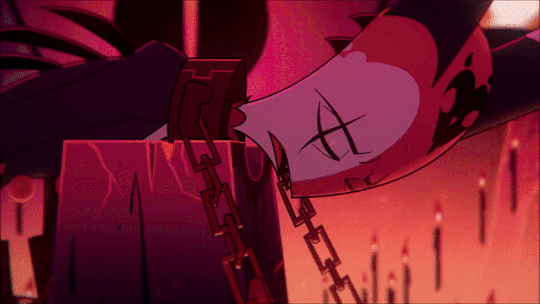
Charlie and Blitz are meant to pick up Lucifer's pieces and to help both the universe (Charlie) and society (Blitz) to change.
Charlie will deal directly with Lucifer (and Lilith)'s original sin and fix the universe they broke. When it comes to Hell's politics, she is going to grow into a political leader, a true princess in a sense:
Charlie: 'Cause right now, we need a leader And it seems to me that Destiny has picked me to be that If you'll permit me So who's with me?
In particular, she is gonna gain more power and influence in the Pride Ring and is gonna take charge of foreign policy (the relationship between Heaven and Hell).
Blitz will disrupt Hell's hierarchy thanks to his business and relationship with Stolas. He will break free from the system:
Blitzo: All I was trying to do was rise above this stupid fucking place YOU ALL FORCED US INTO!
In particular, he is gonna show new paths for imps to advance their statuses and is gonna impact domestic policy (Hell's classism).
Charlie and Blitz's respective "court episodes" are key steps in their parallel journeys, both on a personal level and on a political level.
On a personal level, they both have a revelation about their love interest:

Charlie discovers Vaggie is an angel and sees her darkest side. She needs to go through this because she must realize the world is gray and more complicated than what she thinks.
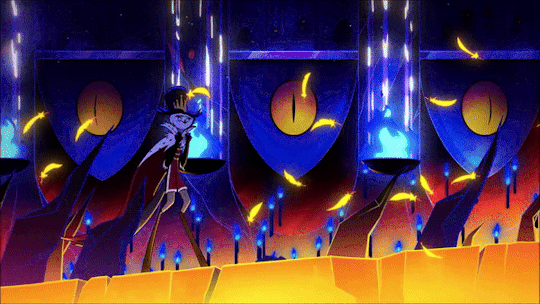
Blitz realizes Stolas's feelings for him and admits his own for Stolas. He sees Stolas's light, in a sense. He needs to go through this because he must understand the world can be warmer and more beautiful than he thinks.
On a political level, both Blitz and Charlie manage to mess Sera and Satan's "order".
Charlie highlights Sera's hypocrisy and for a moment she gets through to the other angels. Even if she loses, she is eventually proven right by Sir Pentious's rebirth as an angel:

Blitz survives Satan's judgement and shows other imps things can change for the better. He gives hope to the lower demons and inspires them not to let Hell define who they are:

On a final note, it is interesting that everything Sera and Satan do to keep things as they are actually backfires.
Sera approves of the exterminations to make sure demons won't upraise. However, this leads Charlie to lead Hell's resistance. Sera dismisses Charlie's Hazbin Hotel project. And yet, precisely because of Sera's refusal to look for a peaceful solution, Sir Pentious dies in the battle and becomes an angel.
Satan spends the trial trying to come up with a punishment, which will strike fear in the hearts of the citizens of Hell. He first decides to kill all I.M.P., but then changes his mind when Stolas tells him this would just turn Blitz into a martyr. The end result is that Satan broadcasts Blitz's struggle and victory throughout all of Hell and makes him a hero.
These are my main thoughts on Sera and Satan's foiling! Of course things may change as the two stories unfold.
In any case, thanks you for the ask and a happy new year!
#helluva boss#hazbin hotel#helluva boss meta#hazbin hotel meta#sera hazbin#satan hazbin#lucifer morningstar#hazbin lucifer#charlie morningstar#blitzø#emily hazbin#stolas goetia#asksfullofsugar#leahbrito123#my meta
75 notes
·
View notes
Text
Society's Sins
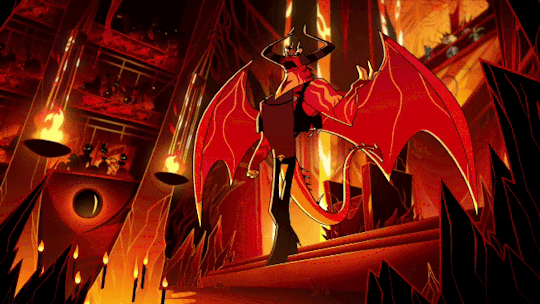
@laughingsour: You mentioned before how Mammon is the only one of the sins who doesn't sing a song to introduce himself and his character during his own first apperance, rather his introduction is by him stealing songs from more talented performers. You noticed how Satan stands in between as he does steal Stolas and Blitzø's song but unlike Mammon he's actually singing himself?
Thank you so much for this ask! It gives me the chance to share some thoughts I have about the episode (which I loved) and the series, as a whole. So, the focus will be the Sins and their thematic role in the story.
First of all, some considerations about the Sins in general.
So far, Ozzie, Bee, Mammon and Satan are the Sins, who have been properly introduced.
Lucifer is a Hazbin Hotel character, so he will most likely not appear in Helluva. However, he is referenced multiple times and his character is very important, even if he is absent (precisely because he is absent tbh).
Leviathan and Belphegor have appeared, but they have yet to speak, so we know very little of them. They will probably get a proper introduction later on in the series.
So, let's focus on the 4 Sins that got at least one episode dedicated to them:
Season 1 has Ozzie and Bee appear - They are positive characters and helpers, as Ozzie gives Blitz the crystal and Bee is kind with Loona at her party. Even in Mastermind, they are the only Sins, who speak in I.M.P.'s favor.
Season 2 has Mammon and Satan appear - They are negative characters and antagonists, as Mammon mistreats Fizz and Satan punishes Blitz and Stolas. Mastermind has them being the most vocal against imps, in general.
At the same time (and here we come to your ask), each Sin gets an introductory song about their vice. Let's go deeper.
SINGING SINS
Asmodeus, King of Lust, has House of Asmodeus:
Asmodeus: You singing love songs in my lustful lounge? Fizzarolli: Ozzie's ain't the place for sentimental sounds! Asmodeus: What'd you expect from a proprietor like us? Fizzarolli: Your demon host, Asmodeus, the embodiment of lust! Asmodeus: Give me a thrust! Fizzarolli: Bwabwabwabwa bwaaaah- Asmodeus: Show me some lust From the groin to the bust In desire, we trust In the house of Asmodeus
The song is an exploration of lust (FizzXOzzie) vs love (MoxxiexMillie) and it's solved by Moxxie and Millie winning and kissing. The final message is that romantic love doesn't weaken lust, but makes it stronger. Later on in the series Ozzie himself embraces this idea and sings the song "Crooked", which empowers his "lust" with "love".
Beelzebub, Queen of Gluttony, has Cotton Candy:
Hey! I'm whatchu need, I'm watchu want I got it all, a carnival I'll bring you up, I'll take you down I'm sticky sweet, stuck in your teeth Like cotton candy Cotton candy (Ah-ah, ah-ah) Cotton candy (Ah-ah, ah-oh) Cotton candy (Ah-ah, ah-ah) I'm whatchu want Not watchu need (Ah-ah, ah-oh)
The song is Bee introducing herself as "cotton-candy". She is an "eye-candy", who loves partying and sharing food with her guests. In exchange, she enjoys others' emotions of happiness and fun, in a virtuous cycle. She basically likes eating healthy, at least emotionally speaking :P
Mammon, King of Greed, sings no song, but has his debut episode called: "Mammon's magnificent musical mid-season special (ft Fizzarolli)".
In other words, all the songs featured in the mid-season special are Mammon's songs. They do not directly say anything about greed, but they comment on this sin in a meta-narrative way. The Sin of Greed is a talentless performer, but he steals others' talents, so his songs are stolen songs. Loo Loo Land is the perfect example of this:
I have a dream (He has a dream) I'm here to tell (He's here to tell) About a magical fantastic place Called Loo Loo Land
After all, the song itself is about Mammon profiting of Lucifer's Lu Lu World theme park. It's sung by RoboFizz, which is Mammon's way to exploit Fizz's voice and body. As a cherry on top, it is a rip off of Charlie's Inside of Every Demon is a Rainbow. It is the perfect embodiment of greed.
What about Satan, King of Wrath?
Satan is just as special a case as Mammon is, but in a different way. As you said, he sings, but not his own song. Rather, he steals Stolas’s. Why? I think that he sings someone else's song to convey he is trying to pass up as someone he isn't:
Satan: I am the mastermind, and here I am the law I've ruled the endless dark Since long before the golden angel's fall
He claims he was the First King of Hell, before Lucifer's fall. However, Word of God clarified this is a lie. So, Satan isn't the Master of Hell, but he acts like him. Similarly, Mastermind is not his song, but he takes it over to affirm his authority. Not only this, but his stanza is pretty ironic:
So you see Next to me, your master plans all look so small Little mice When you break my rules You pay the price!
Satan says he is able to see through others' plans, but throughout the episode he is tricked by everyone.
Andrealphus sets up the whole rigged trial by foreseeing how Satan will react to the whole situation
Striker lies to Satan about who the instigator of Stolas's murder is
Blitz convinces Satan to let the rest of I.M.P. go
Stolas tells Satan he is the one behind everything, when it makes no sense
So, Satan insists that he is a mastermind, but he isn't. That's the point of the song. He presents himself in a way, which is false, hence why the song isn't really his own. Maybe, just like it happened with Ozzie, Satan too will get another song, where he will sing his true heart out (I sure hope so because Patrick Page's voice is wonderful). This would work also because Mastermind is different from the other Sins' songs, in the sense it isn't really about the Sin of Wrath. Why is that so?
SATAN, SIN OF WRATH
Satan: I am the mastermind, and here I am the law (Deadly Sins: He is the law) I've ruled the endless dark Since long before the golden angel's fall So you see Next to me, your master plans all look so small Little mice When you break my rules You pay the price!
Satan's section of mastermind introduces the Sin as the law, so he embodies the wrath against trespassers and rule-breakers. In this sense, he is the physical personification of a draconian law system, which is why he is... well, a dragon :P
Still, this is a very specific interpretation of the Sin of Wrath, which gets weakened by Satan being the only Sin, who doesn't thrive into his vice:
Ozzie owns a sex club, mass produces sex toys and enjoys a healthy sexual life with Fizz. He joyfully sings how he embodies lust and is proud of it.
Bee organizes parties, gives everyone alcohol and food and even shares her own Bee-Juice with others (Verosika), so that they can have fun at their own gatherings. She is the best Queen of Gluttony ever.
Mammon is obsessed with money and is able to market and profit of everything and everyone. He steals from imps, other Sins and even the King of Hell himself. He is a douche bag, but he lives up to the expectation of what Greed is.
Satan is instead shown to try and keep his Sin in check:
Yogirt: Um, Satan? Sorry. W- wh- what did we say about negative energies in our mind temple? Yeah, remember to take deeeep breaths.
He even needs to, if he wants to be functional as the Judge of Hell. This ties with Satan's contradiction: his name means "accuser", not "judge". In a fair trial, the person, who makes a judgement shouldn't be the same, who accuses. However, Satan is uninterested in listening to the different parties:
Satan: Why don't we take a vote. Who wants to listen to hours of testimony? Who wants to kill this imp bastard and get home for lunch?
And he focuses on finding someone to punish:
Satan: You dare try to tell me how to PUNISH!?
He is an "accuser" forced into the role of a "judge". This is why he doesn't sing much about wrath. He is trying to step into the role of another Sin.
I wouldn't be surprised if it were revealed Satan himself is a little bit frustrated by this. Who knows? Maybe the Sin of Wrath is so prone to bursting into rage because deep down he is angry at a certain someone :P:
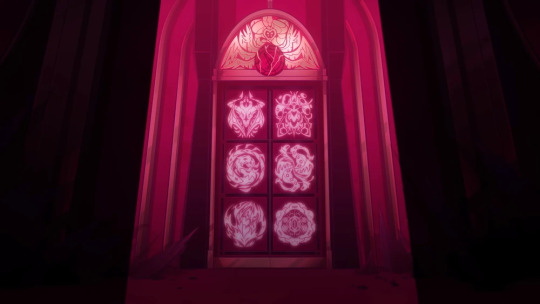
This is a headcanon of course - During the episode, we see a door with all the Sins' seals on it. However, Lucifer's seal is broken. This could be just a symbol of Lucifer's absence and loss of influence. However, wouldn't it be interesting if in canon someone broke it? And who could be both big enough and so prone to anger that he would lash out against an absent king? Maybe the Sin of Wrath himself.
Whatever the case, it is obvious Lucifer's absence has progressively messed up the balance among the Sins. This is why the episode draws a lot of attention to the missing Sin of Pride.
LUCIFER'S ABSENCE
Mastermind offers us a pretty clear idea of the Sins' political standing:
Ozzie and Bee are sympathetic towards the lower classes. They date respectively an imp and a hellound and would like to hear Blitz defend himself.
Satan and Mammon are classist and racist. They look down on the lower classes and are the most eager to kill Blitz.
Leviathan and Bellephagor are more difficult to pint-point, but I think there are two possibilities: 1) They are both neutral, as Levy's two heads can't agree on a political stance (she can't make up her mind :P) and Belle would just sleep throughout most of the discussions 2) Levy is more on Mammon and Satan's side, as she sits closer to them, whereas Belle leans more towards Bee and Ozzie, as her sit is closer to theirs.
In any case, it is probable most of the Sins' disputes would end up in a tie (either 3 vs 3 or 2 vs 2 vs 2), which means a 7th vote is key for deciding. As a result, Lucifer (and Lilith)'s presence was probable pretty important to make the group work. Now that Lucifer is inactive, Satan is using his power and influence to impose himself in every discussion, hence why Ozzie and Bee are annoyed:
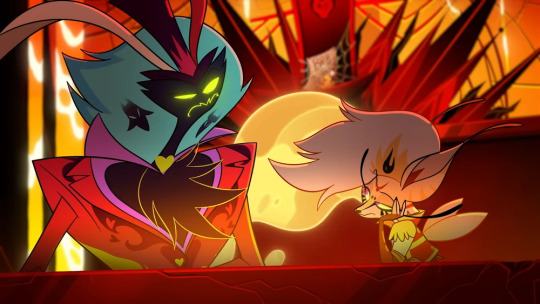
Still, there is more to Lucifer's absence. For example, isn't it interesting that so far he has been mostly referenced in two episodes? The first is Loo Loo Land and the second is Mastermind.
In Loo Loo Land, Lucifer is mentioned directly:
Octavia: Is it true this park is just a really shameless spin-off of Lucifer's far more popular Lu Lu World?
And both his face and symbols appear here and there:
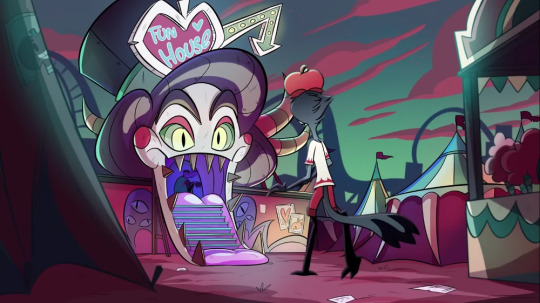
This checks, as Mammon's Loo Loo Land is a rip off of Lucifer's own park. Mammon is so unimaginative that he keeps the apple as a mascotte and Lucifer's head, as one of the attractions. You can also read a sign, where Mammon claims he did not copy Lucifer's ideas.
In Mastermind, Lucifer's name comes up twice:
Stolas: Oh, my Lucifer! What are they doing?
Satan: What in LUCIFER'S HELL IS THIS?!
He is called the Golden Angel by Satan, several symbols related to him appear in the courtroom and his empty seat is shown:
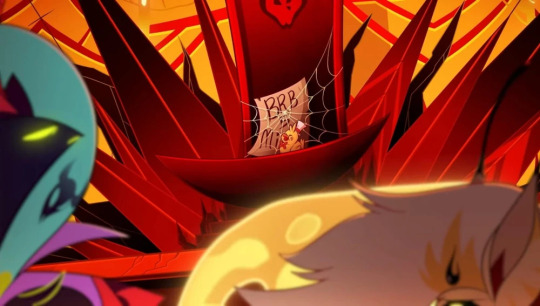
These details are there to remind everyone that he is the true King of Hell. After all, Hell Nobles and the Sins themselves use his name as a swear word and it is implied he is the one who built the courtroom they are all in.
Why is Lucifer so heavily referenced in these two specific episodes? It's because they show two Sins trying to take over Lucifer's Kingdom in different ways.
Mammon copies Lucifer's most commercially successful ideas and takes advantage of Lucifer's depression to evade his lawsuits. He makes cheap rip offs of the King of Hell's greatest hits and grows richer and richer.
Satan takes Lucifer's spot as the leader of the Deadly Sins and rules Hell in his stead. He presents himself as the legitimate King of Hell and imposes his will on the other Sins, who can do nothing, but accept it.
In short, Mammon is taking over Hell's economy, whereas Satan is taking over Hell's politics. They are spreading their influence by using the power vacuum left by Lucifer. Basically, they are trying to become Lucifer. Hence, why they end up referencing Lucifer so often. At the same time, they are clearly creating a society, which stands in opposition to Lucifer's old dreams.
This is obvious in Mastermind, where Stolas's situation is clearly meant to be compared to Lucifer's own one:
Some villain's grand design To use the book To breach the world of man!
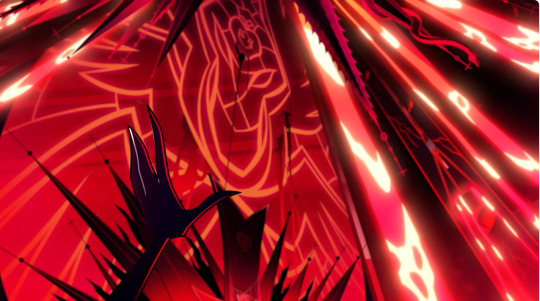
Stolas describes his crime as using a dangerous artifact to mess with the world of man. This is exactly what Lucifer and Lilith did, which is why it is not by accident Lucifer's symbol is in focus, as Stolas sings this part.
Not only that, but Stolas's punishment echoes Lucifer's.
Lucifer is banished from Heaven by the Six Elders:

He is condemned to spend the rest of his life in Hell, with beings considered inferior by angels.
Stolas is stripped by Six Sins of his title and power:
Satan: STOLAS! I hereby strip you of your status, your power, and your title for the next hundred years.
He is condemned to spend 100 years as a normal citizen of Hell, with beings Hell Nobility sees as inferior.
It is basically the same punishment. So, the irony and tragedy of Lucifer is that his own Kingdom ended up becoming a grotesque copy of Heaven. And he actively contributes to it by staying inactive.
At the same time, I don't think it is a chance that the two Sins, who are thriving in this environment are Satan (Wrath) and Mammon (Greed). Rather, I think this ties into Helluva Boss's social commentary.
GREED AND WRATH - SOCIETY'S SINS
Hell is a society where Greed rules the economy and Wrath rules politics. This is why it is a hellish society :P Of course, this doesn't mean every problem society has can be tracked back to Mammon and Satan. Rather, it means these two Sins are so influential because society as a whole lets them. Both the Ars Goetia, who support them to keep their privilege and the lower classes, who adore them. For example, many imps and hell born demons:
Refer to Satan as a deity and idolize him
Love Mammon and buy his merchandise
Moreover, the influence of these two sins comes up in different plot-lines. That's because all the recurring villains so far are motivated by either wrath or greed.
I.M.P. have two recurring villains getting in their ways:
Striker, who is introduced in the Ring of Wrath and is mostly motivated by his resentment for both Hell Royals and Blitz
Crimson, who is introduced in the Ring of Greed and is mostly motivated by money
Stolas has two main villains, who target him:
Stella, who hates him and is mostly motivated by anger
Andrealphus, who wants Stolas's assets and richness
Earth has two recurring groups of antagonists:
The Cherubs, who by this point are bursting with anger against I.M.P.
The Dhorks, who are using their investigation on I.M.P. to get more fundings and technological gadgets
The Cherubs and Dhorks aren't connected to this theme perfectly, but it checks, as they are not part of Hell's society.
That said, Blitz's personal villains and foils (Striker and Crimson) and Stolas's ones (Stella and Andrealphus) all fit the pattern. This was shown also during the trial:
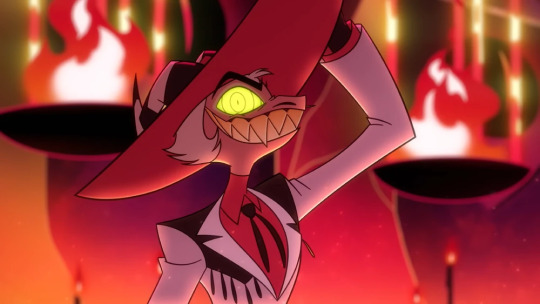
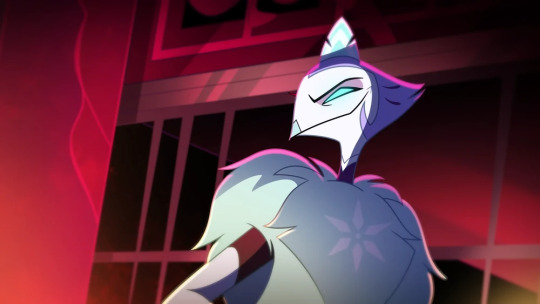
Blitz and Stolas are defeated by their dark foils:
Striker is who Blitz would be, if he gave in to his wrath towards the system and the world, in a destructive way. He is an imp, who hates society, but is so weak and exasperated he can only lash out against those like himself. All to feel some satisfaction and power.
Andrealphus is who Stolas would be, if he only thought about his privilege as a Goetia. A person, who is so sexually repressed everyone can see it and who is motivated mainly by a thirst for power and material gains.
So, Hell Society is broken, but it is broken because both the higher and the lower classes are animated by wrath and greed.
The highest classes are so greedy, they only think about enforcing the status quo. Moreover, they punish violently, who tries to change things.
The lowest classes are so angry, they would lash out against any scapegoat, who is offered to them (see imps hating on Stolas, even if it's obvious he has just saved Blitz). At the same time, they are so blinded by greed, they would do anything for a quick buck, even if it is detrimental for them in the long run.
These are my thoughts on the Deadly Sins so far. Obviously, I may be wrong and things may change as the Sins get explored more. As for now, though, I think this is their thematic meaning and importance for the series as a whole!
Thank you and have a nice day!
#helluva boss#helluva boss meta#hb meta#satan helluva boss#mammon helluva boss#lucifer morningstar#hazbin lucifer#stolas#blitzø#blitzo#asksfullofsugar#my meta#laughingsour
99 notes
·
View notes
Note
Have yo read Captive Prince? What do you think of Laurent's character? Does he foil any other characters (besides being mind to Damen's heart)?
Hi!
Yes, I have and I love Laurent <3 He has the most complex arc and is at the centre of the major conflict, so he foils several characters, who are used to explore his personality and to progress his arc.
In general, I would say three major jungian archetypes are used in Laurent's story:
Inner Child = the childish and most vulnerable part of a person, which is influenced by one's younger years. Laurent's inner child is embodied primarily by Nicaise, but also by every boy abused and raped by the Regent.
Shadow = the repressed part, which the person doesn't want to aknowledge. Laurent has severals: the Regent himself, Aimeric and Jokaste. They all embody Laurent's most negative side.
Anima/Animus = the anima is the female side of a man and the animus is the male side of a woman. It is usually used in romantic subplots to show two characters growing closer. Here, it is embodied by the bond between Laurent and Damen.
Laurent's arc is one where he integrates with Damen, but to succeed he also needs to save his inner child and to face his shadow. Or to fail and try again.
BROTHERS AND LOVERS
Laurent and Damen foil each others' brothers:
Laurent foils Kastor: both are the unfavourite child, but Laurent adores Auguste, while Kastor resents Damen. At the same time, Damen perceives them in opposite ways. Damen initially doesn't aknowledge the good in Laurent, while he doesn't see the evil in Kastor. It is as Nikandros says. At the beginning of the story, Damen sees things in black and white. By getting to know Laurent he learns complexity and that the world is in shades of grey. He integrates his own heart with Laurent's mind. His own idealism with Laurent's wisdom.
Damen foils Auguste: both are strong fighters and beloved leaders, able to inspire others. The moment Auguste dies, Laurent loses his heart and it is only with Damen that he learns to trust and to open up again. It is also through Damen that he overcomes Auguste's death and his sense of inferiority, which is carefully nurtured by the Regent. Laurent is brilliant, but his arc is about showing vulnerability and find new faith in others. He integrates his mind with Damen's heart. His wisdom with Damen's idealism.
So, as you said, Laurent is the mind to Damen's heart and has to rediscover his own interiority. He needs to love himself again. Only by doing so he can truly escape the Regent and grow up. This process of growth is the main focus of the trilogy and it happens twice:
Laurent fails to grow in the second book
Laurent succeeds and completes his growth in the third book
Let's see how.
NICAISE AND AIMERIC = LAURENT'S DARKEST HOUR
Laurent's darkest hour happens at the end of the second book. This is common for a trilogy. It is not rare for the second installement to end in a negative way. Now, The Prince's Gambit doesn't end badly. Laurent and Damen win and grow closer. Laurent even frees Damen and they have sex for the first time. Still, psychologically, Laurent risks a huge brakdown because of Nicaise and Aimeric's deaths.
Nicaise and Aimeric are two parts of Laurent:
-Nicaise is Laurent's child-self. He is petty and capricious, but he cares deeply. And yet, he can't show any vulnerability. The moment he does, he is killed. Moreover, Nicaise plaids for Laurent because he deep down thinks the Regent won't kill him. This is true for Laurent, as well:
"I didn't think he's really try to kill me" Laurent said "After everything... even after everything".
-Aimeric is Laurent's shadow. He is a young man, whose life is defined by the Regent's sexual abuse. Aimeric confuses the Regent's imitation of love with true care and fights to get it back, even if it means hurting people, who truly love him. Unconsciously, this is true for Laurent too:
"You play his games like you want to show him you can. Like you're trying to impress him. Is that it? You need to beat him at his own game? You want him to see you do it? At the expense of your positions and the lives of your men? Are you that desperate for his attention? Well, you have it. Congratulations. You must have loved it that he was obsessed enough with you that he killed his own boy to get at you. You win."
Damen's speech to Laurent is basically the same one Laurent gives Aimeric. Aimeric shines light on this specific aspect of Laurent. Laurent too still loves his uncle. He too wants his attention and on some level thinks of his uncle as his only family:
"When you lost your brother, was there someone to confort you?" "Yes," said Laurent. "In a way".
So, Nicaise and Aimeric embody Laurent's vulnerability. Nicaise is the child who still feels safe with the Regent. Aimeric is the young adult, who wants the Regent back. Both are Laurent. This is why Laurent wants to rescue them both. He grows close to Nicaise and tells him he will buy his contract and free him. He accepts Aimeric into his guard and refuses Damen's advice to send him away. And yet, the Regent uses them both against Laurent. He kills Nicaise and has Aimeric betray Laurent.
Laurent wants to help both Nicaise and Aimeric and the Regent tells him he can't. Just like he can't save himself.
According to the Regent's narrative:
Laurent is fond of Nicaise, but eventually leaves him alone out of selfishness
Laurent welcomes Aimeric in, but this is a blind spot that is used against him
By using vulnerable and abused kids, the Regent conveys to Laurent two messages. On the one hand Laurent isn't selfless enough to truly save anyone. He isn't good enough to be a protector like Auguste. On the other hand he is still foolish enough to trust others. He isn't smart enough to be a mastermind like the Regent. Too cruel and too foolish is how the Regent wants Laurent to see himself. So, that Laurent would feel trapped and cut others out.
And Laurent almost gives in, but is stopped by Damen:
"You tried to hurt me, and you have. I wish you would see that what you have just done to me is what your uncle is doing to you."
Damen goes through to Laurent and stops him from losing himself. He saves him from turning into a copy of the Regent.
THE REGENT
The Regent is Laurent's negative foil. He is who Laurent could become if he gave in to his worst instincts. As a matter of fact Laurent shares many similarities with his uncle:
Both are very intelligent master manipulators
Both are able to seize people's weaknesses and to use them
Both can be cruel and ruthless
Both tend to complicate things
This isn't by chance because the Regent does his best to break Laurent's heart and to warp his mind into a frailer copy of his own. He needs Laurent to think like him and to follow his rules, so that he can beat his nephew. This is why the Regent spends the years after Marlas by abusing Laurent in different ways.
The Regent's abuse has a double nature:
It has a sexual component: the Regent rapes Laurent multiple times as a child and shows possessiveness of him as a young adult. For example, many of his assassin attempts come with a sexual element. The assassins instructed to rape Laurent by using a drogue the Regent clearly used on his nephew as a child. Having Laurent and Damen sleep together, so that Laurent would eventually kill himself. Twisting Laurent and Damen's love story, as if to frame Laurent as dirty and despicable. Spreading voices about Laurent's supposed romantic feelings for Auguste. And so on...
It has an emotional component: the Regent keeps mentioning Auguste, which hurts Laurent in two ways. On the one hand it doesn't let him move on from his brother's death. On the other hand it drills into Laurent he isn't as good as the previous prince
"I hate to see you grown up like this," said the Regent, "when you were such a lovely boy."
The Regent basically blames Laurent for both growing up (physically) and not growing up (psychologically). He manipulates him by treating him as a child, while implying he isn't pure as a child anymore. The result is that Laurent hates himself.
This self-hate manifests itself in recklessness, suicidal tendencies and self-destroying behaviors. Like Laurent lashing out at others, when he is actually furious at himself. This is why specifically Laurent breaks Aimeric by using their shared trauma as a weapon. He hurts both Aimeric and Jord (who hasn't done anything, but being loyal to Laurent) because to truly face Aimeric means to accept himself and he can't.
Symbolically, Laurent kills Aimeric like he is slowly killing himself. This is why Aimeric's death happens after the reveal of Nicaise's murder by the Regent. Laurent kills Aimeric, just like the Regent kills Nicaise. Both victims are abused kids with frail and unstable senses of self, who deep down seek love and vulnerability. The lesson Laurent needs to learn is that he can't save the Nicaise within himself, if he doesn't help the Aimeric too. This is why it is important that Laurent is able to express empathy for Aimeric and to recognize he is a wounded person, just like Nicaise:
"Nicaise knew that when he got too old, he would be replaced." "Like Aimeric," said Damen. Into the long silence that stretched out between them, Laurent said: "Like Aimeric."
It is the first step to aknowledge his own hurt too.
AUGUSTE WASN'T GOOD ENOUGH
The second step is instead to face Auguste's ghost. Laurent's big brother is a double edged sword for the Prince. On the one hand Laurent deeply loves Auguste and is devastated by his dead. On the other hand his idealization of Auguste is unhealthy and leads to Laurent undervaluing himself.
These powerful contradictive feelings come to the surface in his "sparring" match with Damen. There, Laurent for once is able to show all his anger and grief. He lets it all out and is forced to accept he would have never been able to kill Damen in a fight. Still, another realization comes to the surface:
"I know," said Laurent, "that I was never good enough." Damen said, "Neither was your brother." "You're wrong. He was -" "What?" "Better than I am. He would have -" Laurent cut himself off. He pressed his eyes closed, with a breath of something like laughter. "Stopped you." He said it as though he could hear the ludicrousness of it.
Damen's words might seem cruel, but they are actually necessary because they break Laurent's internalised idolisation of Auguste. Laurent has been brought up with the convinction that Auguste is somehow better than him. This idea is present even before Auguste's death because of their father's favouritism. The early loss of his brother and subsequent abuse only makes this feeling stronger. Hence why Damen refusing this helps Laurent grow. Damen is the first one to see Laurent as his own person and to give him a choice:
Damen picked up the discarded knife, and when Laurent's eyes opened, he put it in Laurent's hand. Braced it. Drew it to his own abdomen, so that they stood in a familiar posture. Laurent's back was to the post. "Stop me," said Damen.
Laurent chooses to give up on his revenge. He chooses his present relationship with Damen over Auguste's ghost. He starts wishing for something positive for himself. He starts caring for himself. He starts looking toward a possible future.
JOKASTE = OPENING THE DOOR
To reach this future Laurent has to face Jokaste, who is really another version of Laurent:
"You're lucky we're alike," Jokaste said, stepping down. She and Laurent looked at one another like two reptiles.
Not only that, though, she is Aimeric and Nicaise combined in a single character:
Like Aimeric, she betrays a lover for selfish reasons (apparently)
Like Nicaise, she is caught up in a power struggle and has to choose the side, which ensures her survival, even if it means negate her heart to do so
"You mean, the only difference between us is that I chose the wrong brother?" As the stars began to drift across the sky, Laurent thought of Nicaise, standing in the courtyard with a handful of sapphires. "I don't think you chose," said Laurent.
This time Laurent is able to see this. He empathizes with Jokaste and gives her freedom. He opens her the door:
"We're alike. You said that. Would you have opened the door for me? I don't know. But you opened one for him."
In this way Laurent understands the Aimeric he could not understand and saves the Nicaise he could not save. By the end, Aimeric (Jokaste) is shown mercy and Nicaise (her baby) survives. Laurent gives Jokaste and her family a future. And in this way, he symbolically gives himself a future and a family. He opens his own door.
THE TRIAL
The climax of the trilogy is Laurent's trial in Ios. This choice is interesting on multiple levels:
It is an inversion of the ending of book 1, where Damen is blamed for the assassination attempt on Laurent's life and Laurent protects him. In fatc, it is not by chance that Damen mentions the episode in his initial defense of Laurent.
It shows Damen and Laurent's integration. As a matter of fact Damen is the one who realizes Paschal has the key to dethrone the Regent. He is able to do so because through Laurent he has learnt to observe others, to understand them and to empathize with them. Laurent instead selflessly gives everything up for the person he loves and bravely faces off the Regent with no plan, but simply with his heart. The Regent tries to turn it into a weakness and to force Laurent to give it up, but fails. Finally, he and not Damen is the one who fights Kastor and kills him. He uses the skills he has learnt for his revenge and uses them to protect Damen, instead. He chooses life and love over death and hate.
Most importanlty, though, the trial starts as a farce, but by the end it becomes a fair administration of justice, which punishes the criminal and recognizes the innocent. Let's see how this change happens.
NICAISE = VICTORY
Laurent wins not because of his mind, but because of his heart. Specifically, he wins because of the relationships he builds and of his ability to empathize with the humblest people, those nobody cares about.
First of all, Laurent obviously wins thanks to Damen. It is Damen choosing him over his kingdom that makes it possible to the tides to turn. So, it is because Laurent overcome his internalized hate for Damianos and slowly comes to accept and love him, that he is saved in the end. In a sense, the night where he has to choose if to let Damen die or to save him out of loyalty in volume 1 is when Laurent chooses who he wants to be. He can let a man he hates die without risking anything, like the Regent would. Or he can save that man our of a sense of fairness, like Auguste would. Laurent chooses the latter and makes the first true move towards his victory.
Secondly, Laurent is able to touch the councilors' sense of morality thanks to Loyse, Aimeric's mother. She reveals that her husband basically sold Aimeric to the Regent in exchange of power. She also explains how the Regent conspired with Kastor to kill Theodemes. This testimony isn't decisive because the assassination of Theodemes is a matter of Akielos. Nonetheless, Loyse re-opens the trial and gives importance to Aimeric's story and pain. It is also important that she is a woman because the Regent hates women. She is the character nobody considers, as everyone is focused on Guion's, the powerful councilor. And yet, Laurent does and convinces her to break free from her husband influence for the sake of her son.
Thirdly, Laurent is saved by Paschal's testimony. That said, Paschal is only able to reveal the truth about the Regent's murder of the King only because of Nicaise. In general, Nicaise is a character, who ends up being important in the finales of all three books:
In book one, Nicaise goes to Laurent's apartments after the attempted murder. He is clearly worried and can't decide if to openly switch sides and tell Laurent the truth or not. He also appears to tell Laurent goodbye and to give him his earrings. Symbolically, Laurent is saying goodbye to his younger and most innocent self, as he prepares to enter war with his uncle.
In book two, Nicaise's death is revealed in the climax and it leads to Laurent's decision to march on Charcy. It also kickstarts Laurent's deepest psychological crisis, as he struggles to keep a clean mind and shows how deep he is hurt and desperate.
In book three, Nicaise is the one who indirectly hands Laurent victory, as it is him who stole Govart's papers and gave him to Paschal.
In other words, Nicaise is the one who leads to victory, which fits his name. As a matter of fact Nicaise means "victorious", the person who brings victory and he delivers.
Thematically, this is very important, as Laurent initially regrets to have grown close to Nicaise:
"I killed Nicaise when I left it half done. I should have either stayed away from him, or broken his faith in my uncle. I didn't plan it out, I left it to chance. I wasn't thinking. I wasn't thinking about him like that. I just... I liked him."
He believes that because of their sibling-like bond Nicaise is now dead. He believes his influence isn't enough to break the Regent's control over Nicaise. And yet, it is precisely because of Laurent's love and care for Nicaise that the boy is able to rebel himself enough to steal key documents and to hand them to Laurent's side. Nicaise dies tragically, but his life and Laurent's kindness to him are not in vain. They change the destiny of two kingdoms. Laurent isn't able to save his child-self, but his child-self is strong enough to save him. Just like Laurent might not cancel what happened to him in the past, but can still move forward:
"Stop it, you're hurting him. You're hurting him. Let him go." A soldier was holding him back, and the boy was fighting him. Laurent looked at the boy, and in his eyes was the knowledge that some things couldn't be fixed. He said, "Get that boy out of here."
The new Regent pet once again mirrors a part of Laurent. The side of him that still sees the Regent at family. And yet, Laurent is finally able to accept this part of himself, but is strong enough to start healing. Just like as King he has now the chance to help as many children as the Regent hurt. Laurent ends is arc by growing up. He isn't a child anymore:
"You think you can defy me?" the Regent said to Laurent. "You think you can rule Vere? You?" Laurent said, "I'm not a boy anymore."
He isn't a boy anymore, he can't be controlled by the Regent anymore. He can now start a new life as his own person, free from the Regent and from Auguste's ghost. A life of love and new relationships.
#the captive prince#captive prince#laurent#damen#damianos#the regent#aimeric#nicaise#jokaste#my meta#the captive prince meta#asksfullofsugar#anonymous
320 notes
·
View notes
Note
What do you think of Caitlyn and Vi last scene ? Vi seems a bit odd in it Like she's very tired but soothed at the same time idk. Some people said they can't recognize her anymore. What do you think ? Also do you think Jinx is really dead ?
Hello anon,
I think Caitlyn and Vi's final scene is nice and it is exactly what it seems. They survived war and are free to start a new life together. It is not clear what the "fight" Cait is talking about really is. However, the implication they are gonna face anything that comes their way together is pretty clear.
Vi is simply coming to terms with her grief. She has lost both her father and sister again, so she is not exactly energetic. However, her humming her mother's tune shows she has finally started healing and can face the future.
As for Jinx, they are clearly teasing she is alive. If she were not, Caitlyn looking at the Hexgate's schematics, while holding the remains of Jinx's grenade would make little sense. She even smirks by the end. I personally think this is a good moment for Cait personally because:
She gets involved into the plot investigating Silco and Jinx and is able to uncover a huge underground operation. She similarly ends the series while once again investigating Jinx's "death". However, this time she is happy her enemy has survived.
She starts the season looking at the ventilation system schematic, so she can weaponize the system to kill Jinx. She ends the season by looking at the Hexgate's schematic to make sure Jinx in fact survived.
The scene changing from CaitVi to the blue sky (blue is a color associated with Jinx) and the airship Powder wanted to ride plus the final glitch make it all pretty clear Jinx is alive imo.
Thank you for the ask!
76 notes
·
View notes
Note
Hi! Do you think Alastor and Lucifer are foils?
Hi!
Yes, of course they are!

Alastor and Lucifer's foiling starts in Dad Beats Dad (obviously), where they fight over Charlie's affection. They might seem as opposites throughout the episode, but they are actually the same, as they both try to impress Charlie with their powers:
[ALASTOR:] They say, when you're looking for assistance It's smart to pick the path of least resistance [LUCIFER:] Others say, that in your needy hour There's no substitute for pure angelic power!
Still, Charlie doesn't care and all she wants is for her parental figures to support her:
Charlie: How come he can have faith in me, but my own father can't?
In short, Alastor and Lucifer find pride in their abilities, but need to let go of it, in order to show their love for Charlie. By the end of the episode, they both accomplish this. However, they succeed in slightly different ways, that fit their shared motif of shadow and light. In particular:
Alastor is linked to shadows, as his abilities let him manipulate shadows
Lucifer is linked to light, as his name means morningstar and his powers manifest in light-beams
As a result:
Alastor's development happens in the shadows, whereas Lucifer's in the light - This is true also on a meta-level, as Alastor's arc is the secondary plot-line of the episode, whereas Lucifer's is the main one
Alastor acts as Lucifer's jungian shadow and becomes a catalyst for him to change. Similarly, Alastor himself is challenged to grow by his own jungian shadow, aka Husk
What is the jungian shadow? It is the repressed part of a person. In stories, a character might meet another one, who embodies this hidden part of the self. By integrating with the shadow, the character evolves. In other words, Alastor represents a repressed part of Lucifer and Husk a repressed part of Alastor. Let's see how it all plays out.
ALASTOR, HUSK AND MIMZY
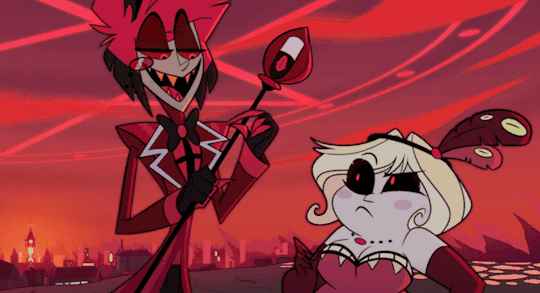
Alastor and Mimzy's bond is unhealthy, as they both enable negative sides of the other. On the one hand Alastor keeps covering for Mimzy, no matter what she does. On the other hand Mimzy feeds Alastor's ego by praising his power and abilities.
So, Mimzy never faces the consequences of her actions:
Mimzy: Thanks for helpin' lil' old me out of a though spot. You're always such a pal.
And Alastor feels respected and appreciated:
Alastor: It's nothing I can't handle. Don't worry Husker. Who in their right mind would cross me?
However, the reality is that Mimzy is using Alastor and Husk points this out:
Husk: You and I both know Mimzy only shows up, when she needs something. That bitch is trouble and who knows what kinda demon she fucked with to come running to you this time?
Not only that, but he openly calls Alastor out on his pride:
Husk: Big talk for someone, who's also on a leash.
Which results in Alastor reacting in anger:

That said, Husk is proven right. It turns out Mimzy has willingly brought chaos to the hotel, so that Alastor could solve things for her. Because of this, Alastor finally cuts ties with her:
Alastor: You deliberately brought danger to this place just to have me clean up your mess. I can't have that here.
This choice is important and it shows how the people around him are slowly impacting Alastor. On the one hand the Radio Demon listens to one of his subjects' advice. On the other hand he acts to protect the hotel. As a matter of fact the moment Alastor steps up as the Host of the Hotel isn't when he sings to Charlie in Hell's Greatest Dad nor when he transforms into a giant and fights. It is when he sends Mimzy away and sacrifices a little bit of his pride to do so. interestingly, this happens as nobody is looking at him, so he isn't really trying to impress nor to trick the others. He acts selflessly in the shadows.
LUCIFER, ALASTOR AND CHARLIE

Lucifer and Charlie's bond is strained:
Charlie: We just have never been close. After he and mom split, he never really wanted to see me. He calls... sometimes, but only if he's bored or like, needs me to do something.
At the root of this conflict there is Lucifer's inability to show his daughter how much he cares. He struggles to express his feelings and hides them behind a prideful persona:
Charlie: I told you when you called me five months ago. Or did you not listen? Lucifer: No, no, no, no. Just, you know, I just forgot. I've just been really busy, ya know with um... important things.
Instead of openly admitting his depression and sadness he prefers to look cold and uninterested. Even dismissive and condescending, like when he arrives at the Hazbin Hotel:
Lucifer: Wow, this place sure looks, uh... Uh-uh. Yeah. Uh-uh. It's got a lot of character!
Lucifer is initially too focused on what he cares about - meeting his daughter - rather than on what Charlie wants - for him to help her with the hotel. He happily hugs Charlie and then immediately moves on to pet Keekee, Razzle and Dazzle, who are his own creations. Only later he considers the welcome Charlie and the others have prepared for him. Even then, he still misses the point and tries to buy Charlie's love by showing off his magical powers:

Haha, looks like you could use some help From the big boss of Hell himself
Except that what Charlie wants from him aren't champaigne fountains or caviar mountains, but an appointment with Heaven, which he negates her. Not only that, but instead of being honest about his fears, he deflects everything on Charlie herself, by dismissing her plan:
Lucifer: Alright, listen, I love that you want to see the best in people, but these sinners... You know, they're just the worst. I, I don't know how much you can realistically expect from them in Heaven.
Luckily, the Radio Demon is closeby, as he forces Lucifer to show his true self.
On the one hand Alastor brings out Lucifer's insecurity and fears:
I'm truly honored that we've built such a bond You're like the child that I wish that I had I care for you, just like a daughter I spawned It's a little funny, you could almost call me dad
He juxtaposes moments of everyday life and affirmations of affection to Lucifer's materialistic and fancy promises. In this way Alastor highlights the faults of Lucifer, as a father. He points out that Lucifer is never there for Charlie.
On the other hand Alastor embodies the kind of sinner Lucifer despises:
Lucifer: Ya see? What I tell ya? Charlie, sinners are violent psychopaths, hell bent on causing as much pain and destruction as they can. There's really no point in trying.
And yet, such a violent psychopath is more willing to help Charlie than Lucifer himself:
Charlie: Dad, stop! He's defending this hotel. It may be a bit more sadistic than I'd hoped. But he's doing it for me!
This realization leads to a confrontation between father and daughter and to an admission on Lucifer's part:
Lucifer: I just don't want you to be crushed by them like... like I was.
The problem isn't Charlie, but Lucifer himself. It is not that Charlie's dream is silly, but that Lucifer's one has been destroyed. This revelation is important because Lucifer's mask comes off and he shows Charlie his weakest and most broken self. He swallows his pride and has Charlie see who her father really his. In all his mistakes and his hurt. And to his surprise Charlie accepts him. Not only that, but she admires him:
So in the end, it's the view I had of you That showed me dreams can be worth fighting for
Symbolically the song More than Anything starts with Lucifer and Charlie in the shadows:
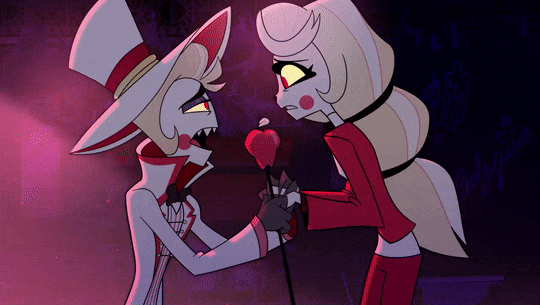
They are repressing a lot and have no idea who the other is. Still, as the song goes on, they get to understand each other:

All that I'm hopin', now that my eyes are open Is that we can start again, not be pulled apart again 'Cause in the end, you are part of who I am
And they end the song surrounded by light:
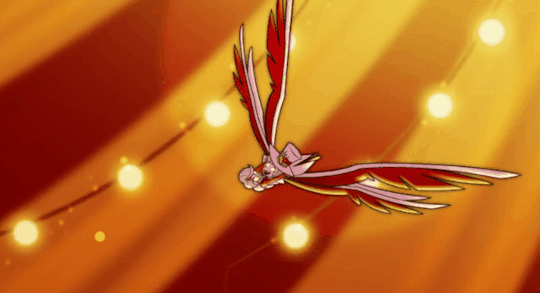
What is initially in the shadow comes to light in three different ways:
Lucifer shows Charlie his true self
Lucifer sees Charlie for who she is
Lucifer exhibits his weakness in front of the whole Hazbin Hotel. He lets the sinners he dislikes so much witness the mess that he is.
His fragility is in full display. It is in the light for everyone to see.
PHENOMENAL COSMIC POWERS! ITTY BITTY LIVING SPACE!

Another similarity Alastor and Lucifer share is that they are two powerful beings that give much importance to free will:
Alastor: You should know better than anyone what a soul can accomplish when they take charge of their own fate.
Charlie: Together, they wished to share the magic of free will with humanity.
And yet, they are both trapped:
Alastor: I'm hungry for freedom like never before The constraints of my deal surely have a backdoor Once I figure out how to unclip my wings Guess who will be pulling all the strings?
Charlie: As punishment for their reckless act, Heaven cast Lucifer and his love into the dark pit he had created, never allowing him to see the good that came from humanity, only the cruel and the wicked.
On the one hand Alastor controls many souls, but his own is owned by someone else. On the other hand Lucifer is the strongest being in all of Hell, but he is regarded as a disgrace by other angels.
Moreover, they both project their unhappiness on others. Specifically, Lucifer blames sinners like Alastor:
Lucifer: Our "people", Charlie, are awful! They got gifted free will and look what they did with it! Everything's terrible!
While Alastor lashes out on his prisoners, like Husk:
Alastor: If you ever say that again, I will tear your soul apart and broadcast your screams for every other disrespectful wretch who dares to question me.
Still, the point is that Lucifer is exactly like Alastor. He is a gifted creature, who messed up royally and cursed humanity. Alastor instead is exactly like Husk, a powerful overlord, who still finds himself chained. Lucifer is the most hated being in all of creation and Alastor is on a leash. They are both lonely and desperate, but too proud to admit it. In other words, they are both losers:
Husk: There was a time I thought no one could relate To the gruesome ways in which I'm damaged But lettin' walls down, it can sometimes set you straight! We're all livin' in the same shit-sandwich
Just like everyone in Hell. And yet, this is not bad per se. Even if you hit rock bottom, you can still climb back up, as long as you let go of self-importance and start to earnestly empathize with others. As a matter of fact it is only through community and bonds that a person can be redeemed and heal:
Out for love Love Think of who you care about Protect them and be out For love Love You're gonna fight without gloves Long as you're out for love
This is what Alastor and Lucifer are learning through Charlie.
TWO DADS, ONE DAUGHTER

Season 1 sets up Alastor and Lucifer as two mentor figures to Charlie. They share this role in a way, which makes them almost perfect mirrors. Some examples:
Lucifer gives Charlie the hotel building and Alastor calls it Hazbin Hotel
Alastor helps repair the Hotel in the beginning, while Lucifer assists Charlie in building it anew by the end
Lucifer guides Charlie to Heaven, as he sets up her meeting with Sera and Emily. Alastor instead guides Charlie in Hell as he introduces her to Rosie and helps her inspire the cannibals
Both Alastor and Lucifer believe in Charlie, when she is at her lowest. Alastor does so before the final battle, whereas Lucifer after the fight
Alastor and Lucifer fight Adam (another foil of theirs) in the final episode. Moreover, both belittle his abilities and highlight how he is strong, but unskilled:
Alastor: You lack discipline, control and worst, you are sloppy!
Lucifer: So, this is what you've been up to since Eden? Gotta say, you really let yourself go buddy.
In particular, Alastor is the one supposed to take Adam down, but fails and Lucifer steps in by the end. This is just like in the beginning Lucifer is supposed to support and help Charlie with her project. Still, he is absent and Alastor fills the spot.
In other words, Alastor and Lucifer are unwillingly complementary and so far one has appeared when the other has been incapacitated. We'll see if this pattern continues. As for now, they are clearly framed as key to Charlie's development, so it is possible they will come to embody different sides of her:
Alastor represents the sinners Charlie wants to reach and all their pain and complexity. He is also linked to fear and the unknown. He is the ally she finds by herself. He is the found family Charlie chooses.
Lucifer represents the angels Charlie wants to communicate with. He is also linked to dreams and ideals. He is the legacy she inherits. He is the biological family Charlie wants to re-connect with.
In short, they are both parts of who Charlie is and she needs them to grow into herself. Just like they need her to mature and find redemption and happiness.
#hazbin hotel#hazbin hotel meta#alastor#alastor hazbin hotel#lucifer morningstar#lucifer hazbin hotel#my meta#asksfullofsugar#anonymous
265 notes
·
View notes
Note
do you think the song out for love says something about Camilla and veggie and to veggies character arc
Hi!
Yes, it does. I want to talk about Vaggie in other metas too, so in this analysis I will focus on her relationship with Carmilla, since this is what you are mainly asking about.
Before I start, though, I am gonna link to you this meta by @hamliet, where she talks about the main message of the song:
You're gonna fight without gloves And when that push comes to shove Yeah, you just might rise above Long as you're out for love

If you love, you might rise above. So Vaggie, a fallen angel, regrows her wings by choosing love and protection over hate and revenge. The meaning is crystal clear. Love makes you worthy of Heaven. Just like in the finale Pentious ascends thanks to his selfless sacrifice.
This is the meaning of the song when it comes to theme and to the series as a whole.
At the same time it is not by chance this theme comes out so strongly in relation to Carmilla and Vaggie, as they are both tied to "love".
FAMILIAL LOVE AND ROMANTIC LOVE
Carmilla Carmine: So I, I'll be your keeper Do whatever it takes, I'll make the mistakes I'll keep you safe and keep this secret
Vaggie: So I, I'll be your armor Do whatever it takes, I'll make the mistakes I'll spend my life being your partner
Carmilla and Vaggie are set up as foils in episode 3, when they share the song Whatever It Takes. This ballad is a love song, but Carmilla and Vaggie express two different kinds of love:
Carmilla is singing to her daughters (familial)
Vaggie is singing to Charlie (romantic)
This is a pattern throughout the show:
There are two versions of More Than Anything - the first one is about a familial bond, whereas the second explores a romantic relationship
Sir Pentious gets redeemed after expressing his feelings for Cherri (romantic) and sacrificing himself for the Hotel Crew (familial)
So, Hazbin Hotel goes out of its way to celebrate all kinds of positive bonds: platonic, romantic, familial. All of these relationships are enriching and help people grow. Vaggie and Carmilla are two characters linked to this very concept, as they are ready to fight and suffer for their loved ones:
Both: Whatever we go through I know I~ (Carmilla: I'll be your keeper) (Vaggie: I'll be your armor) Whatever it takes (Carmilla: I'll make the mistakes) (Vaggie: I'll make the mistakes) Whatever it takes
They are both warriors, but fight for love. They are out for love. However, Whatever It Takes also highlights a major difference between them.
TRUST AND SELF-EXPRESSION
Scrambled Eggs is an episode about trust. This is true especially for Carmilla and Vaggie, who have opposite secrets:
Carmilla killed an angel
Vaggie is an angel
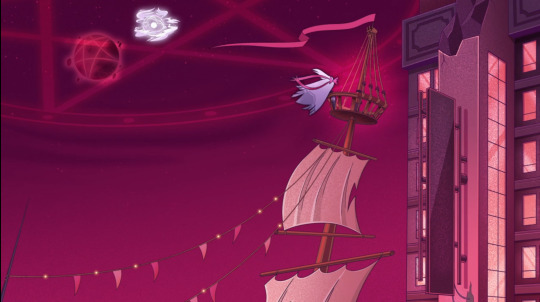
Throughout the song the conflict between Heaven and Hell is mentioned by Carmilla and is present in subtext in Vaggie's stanza, as she looks at her old home.
Both are struggling under the pressure of these truths and are confronted by a loved one:
Zestial: Carmilla, what troubles thou? Losing thy composure is unlike thee. Carmilla Carmine: It's nothing, Zestial, really.
Charlie: Vaggie, don't say that! You do so much! It's- Vaggie: I'm sorry. I'd… I'd like to be alone for a minute.
Carmilla chooses to open up to Zestial and tells her daughters how much she loves them. Vaggie instead closes herself off and refuses Charlie's attempt to talk. She is singing to Charlie, but Charlie herself isn't present to hear her out. Even when it comes to their respective secrets...
Carmilla says hers in the song:
Carmilla Carmine: I always thought that I would keep blood off my face But when that thing attacked, I had to act To cross that line and keep them safe But if anyone knew, then all of Hell would rise to war And who's to say who'd survive the fray? I might lose the ones that I was killing for
Vaggie only alludes to hers in the lyrics:
Vaggie: When I saw your face You made me feel like a stranger in a brand new place And it felt so good to be understood But there's so much I wished that I could say
Vaggie meets Charlie and feels like a stranger in a brand new place because at the time she is in fact a stranger in a brand new place:
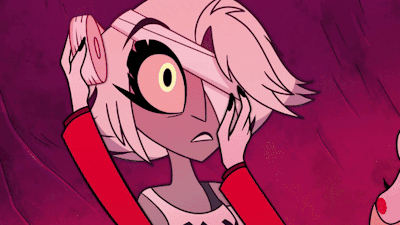
So, Carmilla is able to express herself, while Vaggie can't. This isn't surprising, as Vaggie is basically a child-soldier:
Adam: Do you really think I wouldn't recognize one of my top girls just cuz you're out of uniform? You were on the front lines, I wouldn't forget a bad bitch like you. It's why I named you after the best thing ever. Vaggie.
She is brought up in Adam's army and is taught that love is conditional. She is one of Adam's best fighters, but the moment she makes a "mistake", she is discarded:
Lute: Sinful filth like you has no place in heaven.
This is why she feels Charlie will love her only if she is useful and never messes up:
Vaggie: I'm supposed to make your dreams a reality. I'm supposed to protect you. I'm supposed to never fail you. (...) If I can't help you, what's the point of me?
This fear of abandonement and rejection is also at the root of Vaggie's inability to tell Charlie about her past:
Adam: I guess I'll just tell little miss butterflies and rainbows that she's been fucking someone who's killed-- thousands of her people. I'm sure your relationship will be fine.
Still, despite her communication issues, Vaggie's heart is in the right place:
Rosie: If there's anything I've learned, it's that words are cheap, but actions, they speak the truth. So, what have her actions said?
Vaggie is a person of few words. This may be why she has less songs than other characters. Still, she lets her actions speak, so she is given a ballet lesson by a very talented ballerina:

DANCING THROUGH LIFE
Carmilla has a ballet motif, as her outfit resembles that of a ballerina and her two daughters are called after protagonists of famous ballets. So, it is only natural that she teaches Vaggie a new way to fight through dancing.

Vaggie was taught to fight with hate and anger. So, her fighting style is aggressive and focused on attack:
Carmilla: You leave yourself open with every swing. You fight like someone unafraid of harm, and this is what you'll take advantage of. Angels wield no shields, little armor and fight with reckless abandon.
Carmilla tells her she should instead dedicate herself to love, protection and defense:
Fuel yourself with the fear of losin' That somebody who's your reason to live Harnеss your heart and you can't help choosin' To fight with all you can give
Vaggie shouldn't just fight. She should dance:

She shouldn't hate:
I see you're driven by your detestation Your every step is stoked with animus You need a different type of motivation Or there's no way that you can handle this
She should love:
Out for love~ Love~ Think of who you care about Protect them and be out For love~ Love~
Vaggie listens to these teachings and applies them in the finale, in two ways.
She sings her love for Charlie in More Than Anything Reprise:

Vaggie: You've already done so much So many lives you've changed So many souls you've touched And in the end, if it's only me you've saved Charlie and Vaggie: There's something that I've been dying to say More than anything, more than anything Need you to know I love you more than anything More than anything
As stated above, Vaggie doesn't sing much in season 1, but in the final episode she gets a short moment to express how she feels to Charlie. This is in contrast to Whatever It Takes, where she sends her girlfriend away before she starts singing. More Than Anything Reprise shows Vaggie's progress when it comes to self-expression.
She follows Carmilla's advices while fighting
On a practical level she covers herself up in a battle suit inspired by Carmilla's outfit, she wears a harness on her heart and ties her hair:
Vaggie: I'm not used to fighting with long hair.
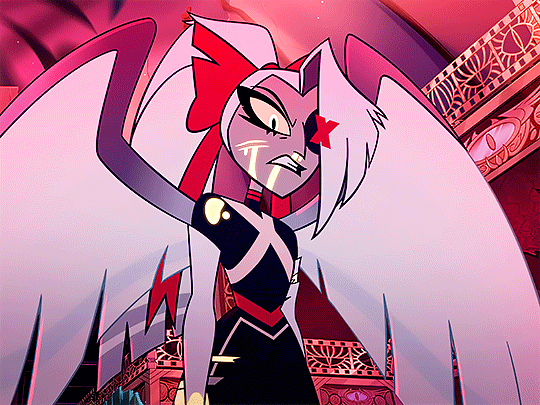
On a thematic level she reveals her wings and defeats Lute, when the exorcist threathens Charlie:
Lute: So, I'll spare you the pain of seeing your demon bitch die.
And Vaggie eventually chooses not to kill the other angel:
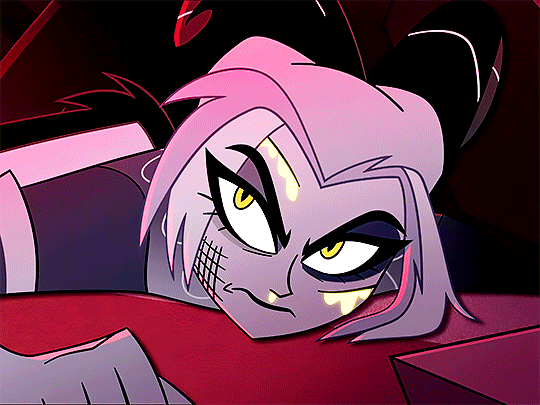
Lute: Do it, then. Correct your mistake. Vaggie: Seriously, you're pathetic, you know that? Ready to die rather than accepting mercy? No, live. Live knowing that you only do because I let you, the failure.
Vaggie is asked to choose between her hate for Lute and her love for Charlie and she chooses the latter. This is why the scene ends with Vaggie leaving Lute and flying to help Charlie. She is given the chance to get revenge, but doesn't take it. She is given the chance to hate, but she loves:
I know you're thirstin' for vengeance, Vaggie You're out for blood But you'll only stand a chance if you're out for love
This is important in two ways:
1- The macrochosm - Vaggie refuses Lute's ideals and defies her expectations. For Lute it is normal that Vaggie is going to kill her. After all, Vaggie is discarded because she shows pity to a sinner, which makes her weak. Still, Vaggie bests Lute in a fight, so she is now strong. It is only obvious then that Vaggie has snapped out of her foolery and is ready to kill. She can correct her mistake. She did not kill the cannibal child, but she can kill Lute. This is how Lute understands the world. And yet, Vaggie doesn't finish her off. By doing so, she moves away from the mentality Lute embodies. She is strong precisely because she can show mercy. Adam is wrong. Lute is wrong. Vaggie isn't out for blood. She is out for love.
2- The microchosm - Vaggie sparing Lute isn't just the morally correct choice, but it is Vaggie's first step into healing:
Husk: (To Vaggie) This one. Judges everyone and everything because she hates herself.
Vaggie hates everyone because she deep down hates herself. She despises Heaven and Angels because she can't forgive her involvement in the exterminations. So, Vaggie hurting Lute would be Vaggie hurting her past self. As a matter of fact Lute is Vaggie's dark mirror. She is who Vaggie might become if she gives in to hate.
A person who hurts others:

And herself:

Vaggie instead has to value her life, so that she can protect others. She must save others and heal herself. Only in this way she can be by Charlie's side. She needs to let go of self-hate to embrace a healthy love. Vaggie's arc is her learning self-love through her bond with the Princess of Hell.
Obviously this journey is just at the beginning and our Angel of Love has a long way to go. How will her story contiue? We can make some hypothesis, which once again stem from Vaggie and Carmilla's foiling. This is just a theory, so take it with a grain of salt, but Vaggie may have a secondary personal antagonist in Hell:

Why is that so? It's because Scrambled Eggs sets Vaggie and Velvette up as foils.
RESPECT(LESS)
Velvette and Vaggie are opposites in their interactions with Carmilla. Both girls are younger than the Dancer Overlord and could learn a lot from her. However, Velvette refuses any kind of mentorship and shows no respect:
Velvette: Mad that I acted respectless? Well, it's cause no one could respect this! You're long past trending! Sorry, bae, but I ain't swiping right! You've lost your relevance-
Vaggie instead comes to respect Carmilla and learns from her:
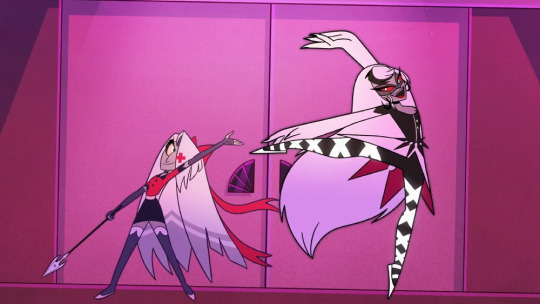
At the same time, both Velvette and Vaggie confront Carmilla about her secret:
Velvette: 'Oops!' Did I strike a nerve? 'Cause when I brought out the angel's head, couldn't help but observe, that your wrinkled face was turning red! And why are you avoiding war? That's what the guns you sell are for! Thanks to my being respectless, one thing I'm starting to suspect is You know why this angel's headless! Do you have a disclosure?
Vaggie: I know what you did on extermination day. We can talk about it inside, or I can yell about it out here.
They call Carmilla out on killing an angel and keeping this knowledge to herself. Not only that, but both argue that it is necessary to fight back to stop the exterminations:
Velvette: We found it during Extermination day. If these Holy Rollers can be killed, the game has changed. We can take the fight to them. The boys and I have come up with a full assault plan!
Vaggie: Miss Carmine, I'm here on appointment from the princess to enlist your aid in the defense of hell from the angelic extermination. We know an angel fell at your hands and we need to know how.
Still, Velvette fails to get through to Carmilla because she uses war rhetoric:
Velvette: Oh, I get it. So Grandpa is too pussy to fight, so I guess there's no point, right? Oh, what's the matter, Fossil? Too senile to make a real power grab...
She speaks of violence, strength and power.
Vaggie instead convinces Carmilla to help because she mentions the necessity to fight for loved ones:
Vaggie: We didn't pick this fight, but it's here now. And they aren't going to stop with us. You didn't see the look on their leader's face. With us out of the way, it's only a matter of time before they come for the rest of you. They won't stop until all of hell is wiped out, so you can help us make a stand here together, or you can stand alone tomorrow.
She speaks of protection, love and comraderie.
In short, Vaggie succeeds where Velvette fails. Of course, this is true for Charlie's group in general when it comes to the Vees:
Vox: My dear people! We at VoxTek Enterprises have always been at the forefront of innovation. And now, with this new oncoming threat, we are shifting our focus, to your protection. We are pleased to announce VoxTek Angelic Security is coming soon! Trust us, with YOUR safety.
Katie Killjoy: Breaking news - Extermination day is cancelled! Charlie Morningstar managed to fend off the angelic attack with more than just nice words.
The Vees make big declarations of how they are gonna protect the people of Hell, but in the end it is Charlie and her friends who fight for the sinners.
When it comes to Vaggie and Velvette specifically, it is going to be interesting if their foiling is expanded. If so, then I guess Velvette is gonna help Vaggie mature a little bit more, so that when our ex exorcist faces Lute (her nemesis) again, she is gonna be ready for it.
#hazbin hotel#vaggie hazbin hotel#vaggie#carmilla carmine#velvette hazbin hotel#chaggie#charlie x vaggie#hazbin hotel meta#my meta#asksfullofsugar#anonymous#hazbin lute
148 notes
·
View notes
Note
So you said Oshi no Ko is inspired by Monster. How do you think the endings compare?
.


Hi!
Thank you for this ask, I wrote about the comparison between the two series here. As far as the twon endings go, well, I think Monster's is masterful, whereas Oshi No Ko's is mediocre at best. It is not a narrative disaster exactly, but it is not good and since the rest of the story is very well written... well, the drop in quality is felt.
So, let's go with the comparison. First of all, for whoever does not know about Monster (and should) here is a synopsis and a quick foiling between the series and OnK.
NAOKI URASAWA'S MONSTER
Monster is one of Naoki Urasawa's work and a masterpiece to be honest. Here is its premise (spoilers! also read this story, if you have not and disliked Oshi No Ko ending... or in general just read it... it is wonderful).
Kenzo Tenma is a Japanese surgeon working in Germany during the Cold War. He is a prodigy, so his superiors usually assign him the cases of rich and important people. One night he finds himself in front of a choice. A child, Johan, arrives at the hospital with a bullet in the head and some minutes later he is ordered to operate on an influent politician. However, Tenma chooses to make the ethical choice and saves the child. This costs him his career, but he still feels he did the right thing. Some time later both Johan and his traumatized twin sister Nina disappear, just when Tenma's superiors all mysteriously die. As a result, Tenma becomes the head of the clinic and manages the hospital in a way it helps as many people as possible. Still, ten years later Johan comes back into his life and it is revealed that not only he is the one who killed Tenma's superiors, but also that he is a serial killer. Tenma and Nina go through parallel journeys to try to both stop Johan and discover more of the twins' mysterious past. Meanwhile, Tenma's ex Eva and Inspector Lunge look for Tenma for different reasons. Eva wants to both go back together with Tenma and get revenge on him. Lunge believes Tenma is the culprit behind Johan's mysterious streak of murders.
As you can see, there are some similarities with Oshi No Ko:
Monster is the story of a surgeon, who must track down a serial killer whose life he has saved. This monster is one of 2 twins and the story deals with the brother and sister uncovering their past
Oshi No Ko is the story of a doctor, who is murdered and reborn as his favourite idol's child. Together with him there is a twin sister and they must uncover their mothers' past and killer.
In short, in both series there is a pair of twins and a murderer. It is just that in Monster the twins have no memories nor sense of selves, while in Oshi No Ko they have too many memories and baggage.
In both stories, there is a villain (Johan and Kamiki), who is both victim and perpetrator and difficult to understand. This villain is a satanic archetype, who is excellent at manipulating people. He is a serial killer, who reiterates the traumas of his past over and over, out of a sense of emptiness.
Finally, in Monster the characters must uncover the truth behind Johan, while in Oshi No Ko they must find out who Ai really is. The former is about understanding a monster, whereas the latter is about empathizing with a goddess.
Now that we have the basic foiling down, let's try and explore the two endings. Monster's fully explores the theme it set up to explore. Oshi No Ko's instead doesn't. Let's see why.
JOHAN VS AI
Both Monster and Oshi No Ko have a main protagonist (Tenma and Aqua), who is trying to solve a mystery centered on another person (Johan, Ai). As a result, both Johan and Ai find themselves at the centre of the story. Readers keep on reading because they wanna uncover the mystery behind these two characters. Who is really Johan and why did he become a monster? Who is really Ai and what was she lying about?
However, the two series' payoffs are very different.
On the one hand Johan stays the heart of the story from beginning to end. His past is slowly revealed and there are several twists, which add depth to his character, while keeping the mystery strong. Finally, the very last chapter is called "The True Monster" and it offers a final interpretative key to understand Johan. Basically, up until the very end, Johan remains the key character and up until the very end there are things left to discover about him. His story is intertwined and foiled with that of everyone else's. From Tenma to Nina, to Eva to Lunge to Grimmer... everyone is a foil to Johan.
On the other hand Ai stays at the heart of the story up until the arc, which should be about her. The movie arc is where Ai progressively disappears from the narrative. Her role is slowly overtaken by Hikaru and later on Hikaru too disappears, so that Aqua can have his sad pretty boy moment :P. The story sets up a mystery about Ai, but it solves it at the very beginning with the climax of her arc. The story promises more about her, like an exploration of her idea that loving someone is to lie to them. However, when the time comes to explore this mentality, its toxicity and its contradictions are glossed over. Everything is overly simplified, so that there can be cheap twists.
The big reveal about Ai is that she truly loved Hikaru, even if she herself did not fully understand it... However, this was something clear even before it was told. Now this is not bad per se, but for this reveal to have any impact, it should have been built up differently. Ai's love for Hikaru, either good or wrong, should have been explored more and problemitized. For example, it is obvious Ai loves Hikaru when they meet... but would she love him even if she knew he would have turned out a killer? Would she have forgiven him, even if Hikaru had tried to hurt Ruby? Did Ai know it was Hikaru killing her? Or did she not know? A lot could have been done, for example, with the white rose... She could have understood it was Hikaru, if this flower had any particular meaning in their relationship... Actually I was waiting for the flowers to become meaningful, but then they did not. Rather it seems Hikaru started using them as his signature flower after Ai's death.
Not only that, but Ai's own children do not even have to struggle to empathize with her and discover how she felt, Ai herself told them directly. Overall this revelation, which is built up from the beginning ("Will Ai forgive Hikaru or not?") literally means nothing. Aqua isn't conflicted about it, Ruby delivering the line, where she forgives Hikaru in the movie is not even shown. Finally, Ai's feelings do not change Hikaru, nor have any real impact on him. Neither for good nor for worse.
Let's highlight that Monster does have a similar moment, where a character empathizing with another is framed as too little too late:
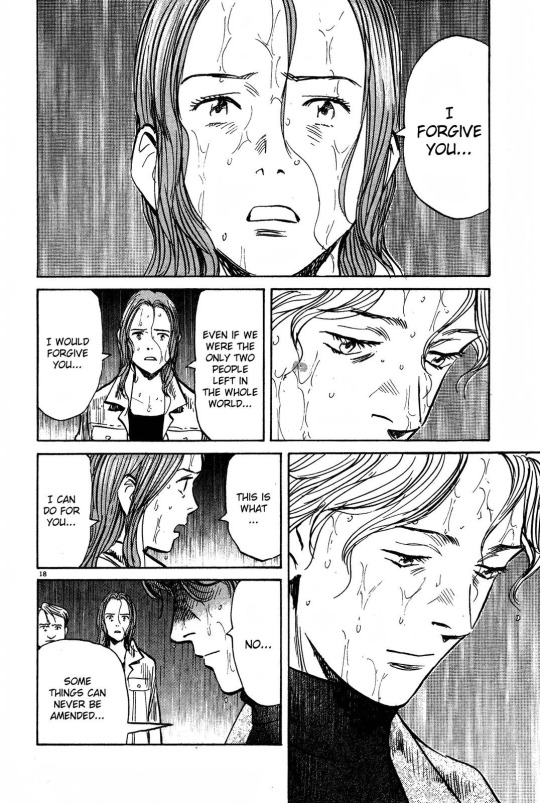
Here, Nina finally forgives Johan for his crimes. She does so as she is finally able to remember their shared past, to accept it and to accept herself. Her act is first of all an act of self-forgiveness and shows her growth from a traumatized girl focused on revenge into a forgiving and empathetic person, able to embrace the good in the world. It is the climax of her personal arc. However, her forgiveness does not change Johan nor stops him. Johan says it is too late and is ready to either kill or be killed. His line about how "some things can never be amended" refers to both his own crime and Nina's previous refusal of him. He refuses to forgive both himself and Nina. And yet, Nina's choice still matters. In fact, even after Johan refuses her forgiveness she sticks to it and when she gets the chance to let Johan die, she doesn't and insists he must be saved.
Ai's love and forgiveness of Hikaru is instead glossed over, as it is her final wish. Again, this would be fine if it was given any depth. It could have been framed as Aqua and Ruby having to dismiss Ai's final wish as a way to truly live their lives. Not held back by Ai's memory, as painful as it was. A way to let Ai go. Instead nothing of it happens. Ai is in the end nothing more and nothing else than the character so brilliantly summarized by the song "idol". Nothing of which we discover about her comes close to the power of her introduction and death. It is a pity because her relationship with Hikaru, her confused feelings of love and her choice to forgive him (or not) could have been great.
NINA AND JOHAN VS AI AND HIKARU
Nina and Johan are like Ai and Hikaru, as they are an exploration of how different people react to trauma.
Nina represses her bad memories, whereas Johan clings to them. That is the difference between them:
Nina refuses her trauma. She builds an identity that negates everything her trauma represents. She forgets about it all and when she tries to retrieve her lost memories through hypnosis, she tries to strangle her therapist.
Johan embraces both his and Nina's trauma. He builds a self identity that is everything their trauma represents. He is so scared of being nobody that he mistakenly confuses what Nina shares about a traumatic event with his own memories.
So, you see... Nina is a protagonist and Johan is a villain, but the point of their foiling isn't that she is good and that he is bad. Actually, the point is that Nina can be good because she has been relying completely on Johan to protect her. She has been burying her own memories, so that she could depend on Johan's violence to survive. Of course this is not done on purpose and it is a tragic consequence of the twins' tragic childhood. Still, what seems as a very straightforward case of good twin and evil twin turns out to be far more layered and complex.
The same isn't true for Ai and Hikaru. Ai and Hikaru's foiling stems from the fact they are both objectified by others. They are idols, objects of adoration and they resent this situation. They suffer and are unable to forge a real relationship with another person. They literally do not know how because they are both objectified by others, so they objectify others in return. Ai wants to love Hikaru, but is not sure of how to do it. Hikaru ends up idolizing Ai, like others do. This is an interesting premise, which would have been perfect to explore the main theme of objectification and love... except the series doesn't.
The solution of Ai and Hikaru's foiling isn't that you should not idolize others... even if the idea seems to be suggested multiple times throughout the story:

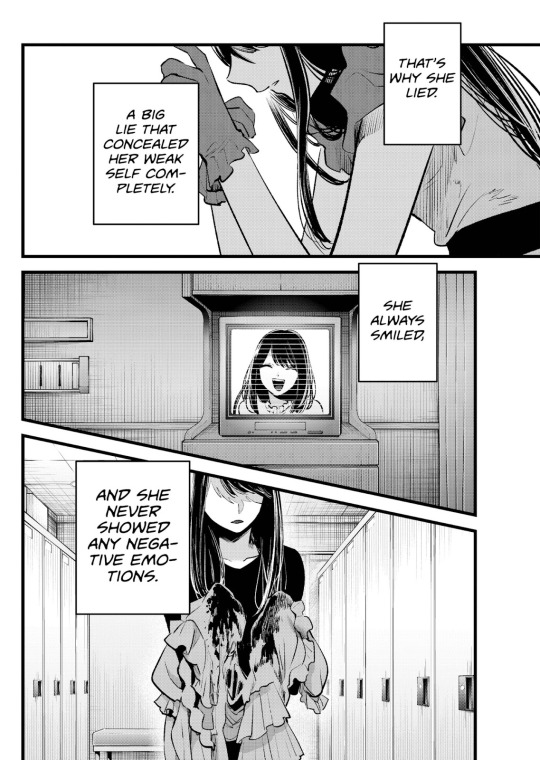
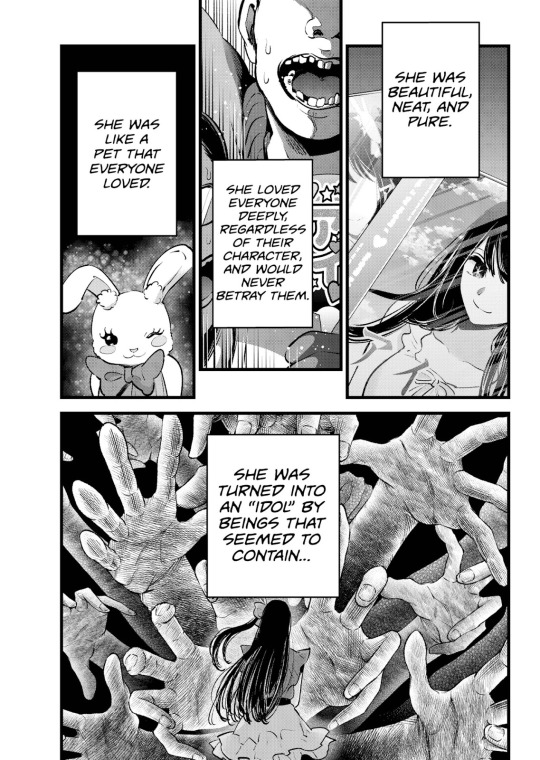


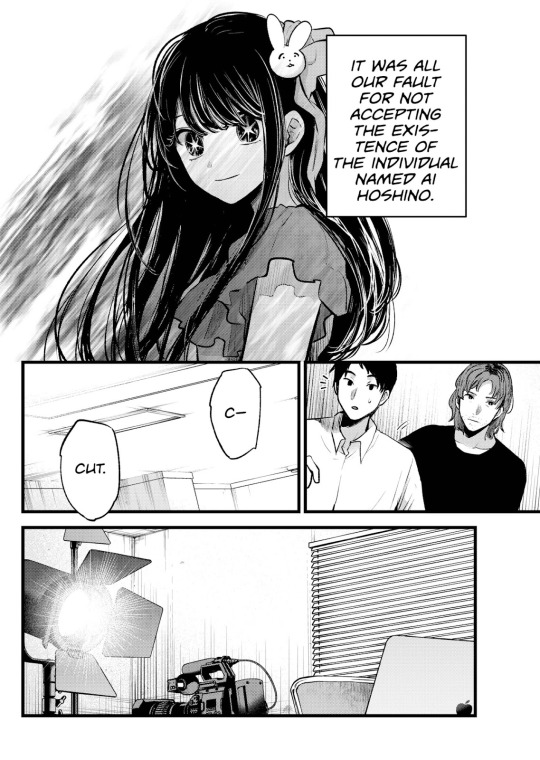
The solution is that there is a positive idolization:

And a negative one:

So, Ai is a good idol because she accepts the love others give her, loves them back and brings them joy.
Hikaru instead is a bad idol because he uses his influence on others to hurt them.
Now, I do not hate this foiling tbh. I think again that with the proper exploration it could have been fascinating. I also think the series never meant to negate the fact entertainment and idols can bring joy, fun and inspire others. Still, you can't introduce a third dimension to your theme (people should not be objectified) and then go back to a white and black vision. It creates a dissonance, if done poorly. And I think here it is so.
NINA AND JOHAN VS RUBY AND AQUA
As explained above, Nina and Johan are a twist on the evil twin and good twin. In particular, Johan willingly acts as Nina’s shadow.
The shadow is everything the person represses and does not want to see about herself. It is a concept that truly fits Nina’s character After all, when we meet her:


She is running away from the darkness and violence of her past.
Nina is determined not to really face her shadow. This is why she represses her memories, tries to kill Johan when she discovers what he has done:

And tries to kill him again after she remembers him as an adult. However, you can't kill your shadow. You can only accept it. Nina does not and symbolically her attempted murder of Johan leads Johan to grow more and more desperate until he spirals completely.
Ruby and Aqua play with light and darkness, as well. In a sense, Aqua does try to act as Ruby's shadow as he is the one who is ready to face darkness and die, so that Ruby can keep on shining brilliantly and live.
By the end Aqua dies for Ruby's life, but in his last moments he wishes to live:

I would not be surprised if Ruby kept on living, despite the darkness she feels inside:
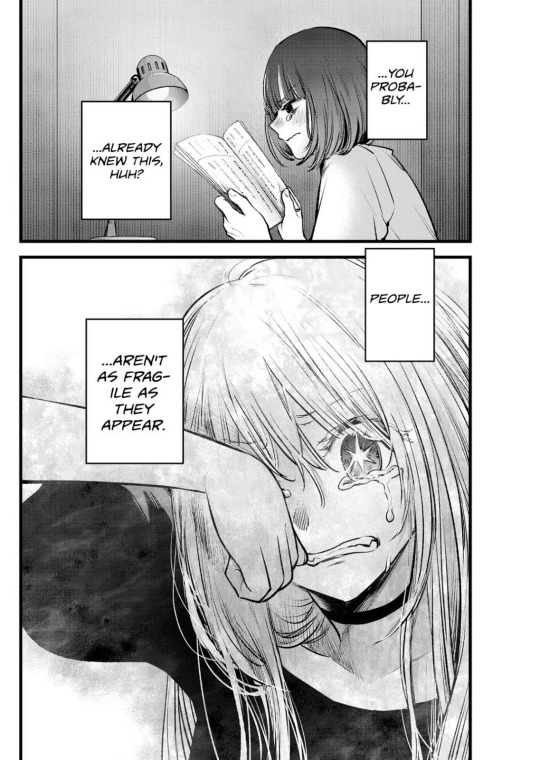
That said, both Ruby and Aqua have a dimension, which is never fully explored:

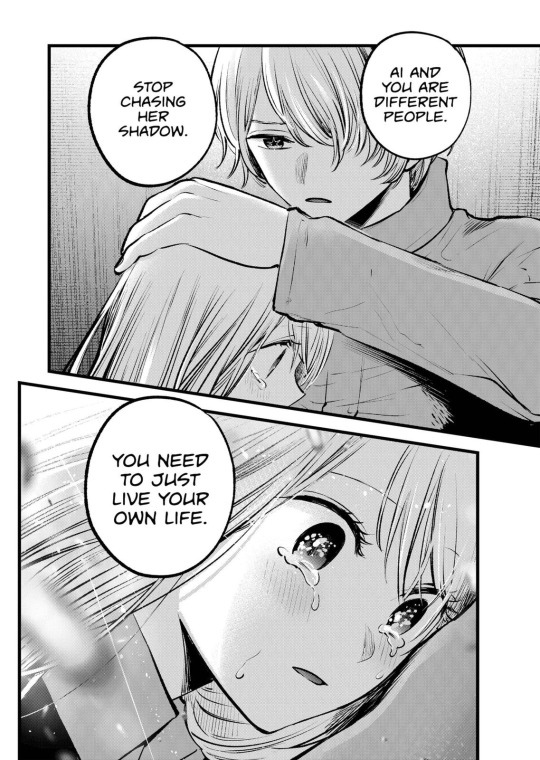
Aqua and Ruby have moments where they lose the star in their eyes and get the chance to simply be people. However, this dimension is never fully addressed (especially for Ruby) and quickly disappears. Once again the dimension, where idolization can be refused is only brought up briefly and never truly explored.
Finally, both Johan and Nina and Ruby and Aqua have an unhealthy obsession with each other, with some incestuous subtext. Still, this obsession is treated very differently.
Johan sends his sister flowers and tells her "he was born to smother her with flowers". He is also obsessed with her and at one point he crossdress as her (also to confuse the people who are following him). Still, this obsession is presented for what it is: wrong. Not only that, but despite the creepy flower lines, Johan and Nina's relationship is never presented as sexual. Johan is obsessed with Nina and organizes his whole identity around hers... Still, there is no kiss, nor love confession nor attempted rape. The subtext is used in the beginning to convey Johan's obsession and disappears as the story progresses and we get to better understand why Johan is obsessed with Nina.
Aqua and Ruby's incestuous subtext is instead never solved. Personally, I was not so outraged by Ruby having feelings for Sensei, cause I thought it was something she had to overcome in order to grow up tbh. I saw it as a freudian motif, an obsession Ruby would have overcome as she finally leaves Sarina behind and embraces her new life. However, this does not happen. Ruby straight out tells Aqua she loves him and this is never addressed again. Aqua has an inner monologue about how he loves Kana and the person Ruby loves was his past self... But this is not the point. The point of such a plotline, if you wanna insert it, should be that Ruby has to get over Sensei, realizing she never truly fell in love with him... but rather that hers was a simply infatuation. A precocious crush and nothing more. Instead this never happens and ends up being completely irrelevant and taking away time that could have been used for more relevant plotlines.
JOHAN VS HIKARU
Finally, let's talk about Johan and Hikaru. Both characters want to do the same thing: they wanna deconstruct the Freudian Excuse trope:
The writers have a villain, and they want to give that character some depth. The obvious solution is to Pet the Dog. Unfortunately, that tends to make the character less scary, causing Badass Decay and Villain Decay. Instead, writers may keep the villain (especially The Sociopath) just as vile as before, but reveal that they have a reason for being that way. The most popular one is the Freudian Excuse: the villain had an abusive and particularly violent backstory (such as Abusive Parents, being bullied by peers, being raped in the past, etc.), making them insane and warping their perception on the universe, and that's why they're sociopathic Serial Killers going on a Roaring Rampage of Revenge, or why they want to destroy everything out of their misery, or why they're Straw Nihilists who adhere to The Social Darwinist philosophy that it's a Crapsack World where Might Makes Right.
Both are young men, who went through horrible traumas and were turned into monsters. Still, Johan deconstructs this trope successfully imo. Hikaru instead doesn't.
Johan's story keeps on presenting and subverting or deconstructing popular tropes associated to villains:
At one point he says there is a "monster inside of him". Nina takes it at face value and thinks Johan has a double personality. However, this is proven false. It is a simplistic black and white solution to Johan's mystery, which is quickly discarded.
Secondly, Tenma discovers Johan as a child was taken into an abusive environment, where experiments were taken on children, to the point they would lose their humanity and memories. Obviously he believes this is what warped Johan. Except this is not the case... Johan was already a killer when he joined this abusive environment. It obviously had an effect on his psyche, but it is not what "created him".
Thirdly, it is revealed one of the twins witnessed a horrible and violent massacre. Everyone, including Johan himself, believes it was him who saw all this, becoming traumatized. Except it is finally revealed Nina is the one who saw the massacre play out, then she told Johan and eventually repressed this horrible memory. Johan instead made this memory his and tricked himself into believing he had really witnessed the whole thing.
So, Johan's story is one which masterfully deconstructs popular tropes. He was not changed because of one bad day. His self is the resulf of all his life: it stems from his weak lack of self, his and Nina's trauma, his fear of being betrayed by adults and his wish to protect Nina. Everything we discover helps us understand him, sure. However, it does not excuse him because Nina too underwent the same experiences and did not become a murderer (even if she could have).
Every twist does not detract from what we previously knew, but adds to it and it creates a character, who is both a monster and human.
Hikaru is instead reduced to a very cheap "cool motif, still murder". He is introduced as horrible since he is shown killing an actress. Then, he is humanized throughout the movie arc and he is given complexity. Some revelations are potentially interesting... Like the fact he did not willingly kill his rapist (I thought he did) and the idea he did not even mean to kill Ai. However, everything is then sacrificed to turn him into a big bad and a monster. Now, tbh I actually LOVED the twist Hikaru was the final villain. I had found the happy ending very cheap and I thought that this twist was there, so that we could have had a more gray conclusion, with some deep dive into Hikaru's head. An exploration that showed how he was a villain and maybe lost, but also that explained to us his reasoning and showed him as very human.
I would have loved if his confrontation with Aqua and a later confrontation with Ruby could finally wake him up and let him see his children as people, instead than tools to just reiterate his obsession for Ai. Like, I even think Aqua set up the perfect chance for redemption for Hikaru. As in the end, he could have taken the fall for the ONLY crime he did not committed, that is Aqua's attempted murder. So, that he would go to prison leaving Aqua and Ruby to live as they wanted. instead, we have a character, which was presented as complex reduced to a caricature of himself. By the way, if you wanted to show Hikaru was too gone... I think you could have done it... but you can't add complexity to a character and then take it away. If you do so, then you are bound to make people angry.
Again, Monster does successfully present Johan as a monster. He does a lot of horrible things and by the end you, as a reader, do not really have to forgive him. The story even lets enough space for you to wonder if the characters did the right choice into saving him. Moreover, Johan's past does not justify his actions in any way. Still, whatever you might think about Johan morally, you arrive at the end of Monster with the acknowledgement that Johan is a person. Not only that, but the point is that he is a monster PRECISELY because he is a person. It is his humanity, which turns him into a monster. Just like his humanity might help him become a person once again.
SECONDARY CHARACTERS
Without going too deep into this, but Monster has two other main supporting characters, other than the 3 main protagonists (Nina, Tenma and Johan). They are Lunge and Eva. Both of their arcs complement the themes, both are gorgeous, tie into the story and are completed. They advance the plot and subplots, but they are not sacrificed to it. In particular, Eva is a great example of how to take an overused misogynistic trope (the crazy ex-girlfriend) and how to make a wonderful character out of it. Eva is initially a horrible person, she is selfish, a woman-child, obsessive. She is also hurt, lonely and suicidal. As the story goes on she blooms into her self. She spends the majority of her story wanting to get back together with Tenma. And Tenma save her multiple times. However, by the end it is not through Tenma that she changes. She develops thanks to the meeting with another character. And in the end she ends up alone. Her arc is that she needs to stop depending on others and must forge her own life.
In comparison, Kana and Akane start the story as two wonderful characters. They have their own arcs, they tie into the plot and into Aqua's arc. However, they also feel, as if they have their own subplots, as well. Except that by the end, the ball is dropped and both are reduced to pieces of Aqua's harem. Their individual arcs do not matter to the story anymore. The relationship they have with each other, which is set up as extremely important, is left unexplored. Their contribution to the story is that they are both in love with Aqua, but their loves for him are not challenged. Kana is in love with Aqua's mask and never gets to discover the real him. Even if she is set up as his love interest since their first meeting. Akane's love for Aqua is set up as an obsession and a lie, something she needs to overcome, so that she can have a real relationship with him. One rooted in respect and friendship. Still, she is left crying, idolizing Aqua and regretting that they could not have killed Hikaru together. All of this is kind of distasteful imo.
THE ENDING
In general, Oshi No Ko's fake happy ending is Monster's ending, but cheap.
The character set up as the monster (Hikaru/Johan) is given complexity
The main girl (Ruby/Nina) forgives him and symbolically saves him
The main protagonist (Aqua/Tenma) eventually lets go of revenge and in this way he saves himself
The character at the core of the series (Ai/Johan) is finally understood and their mystery is solved in a way that frees the characters
Still, Monster does this in a way, which is real. Nina and Tenma has to struggle with forgiving Johan. Up until the end they are unsure of what their choice will be: murder or forgiveness. Aqua and Ruby's choice to forgive Hikaru is glossed over. It could have been such a cool opportunity especially for Ruby's arc. Where her forgiving Hikaru (her parent) as Ruby might have tied with her forgiving her parents as Sarina. It could have been a way for her to find closure.
However, the author preferred to use all Monster's trope in a cheap way to justify a dark twist and a tragic ending, which is not as powerful for the simple reason the story itself is not written as a tragedy.
It is funny really because often people think tragic ending are more powerful than positive one. More cathartic. And they can be. However, in this case, Monster's positive ending is way deeper and more cathartic than Oshi No Ko's superficial one, which is rooted in shock value.
56 notes
·
View notes
Note
Hello! Have you seen the new page about Pakunoda in Hunter x Hunter’s new volume? What do you think it adds to her character?
Hello!
Thanks to you, I checked it up :D
I love the extra page! I think it does not add anything new, but rather it ties into Paku's characterization and arc. Basically it gives it an ulterior layer and more depth.
Paku's restriction "to never touch the one she loves the most" and the implication this person is Chrollo nicely complement her original story-line. And it does so in different ways.
Paku's power is a metaphor for empathy and intimacy. Her choice to never touch (so to never use it) on Chrollo means she is giving up on him, in a sense. This means:
She chooses to prioritize the Spider over her own personal feelings for Chrollo
She gives up on trying to fully communicate and/or understand Chrollo
Clearly the loss of Sarasa has a huge impact on this choice. On the one hand it is probably Paku understood would have chosen to forever wear a mask. Suffocating his empathy and sensitivity. So, she chose to do the same, in order to keep being by his side. On the other hand it shows how Paku too chooses to sacrifice a part of herself in order to avenge Sarasa.
At the same time, it shows how complicated Paku and Chrollo's bond was. On the one hand Paku choosing to never "steal" Chrollo's memories can be read as a sign of trust and respect. On the other hand it can be seen as Paku giving up any real closeness with him. Both physical and psychological.
This all comes down to Paku's arc in York Shin. There she symbolically chooses to prioritize her feelings for Chrollo over the Spider. She chooses him over the organization. And yet, this does not bring the two of them closer. It really makes so Paku ends her life as far away as Chrollo as possible. Both physically (Chrollo can't either talk nor interact with her in any meaningful way) and philosophically (Chrollo wanted Paku to choose the Spider, whereas she chose Chrollo).
This is why their last scene together is heartbreaking:
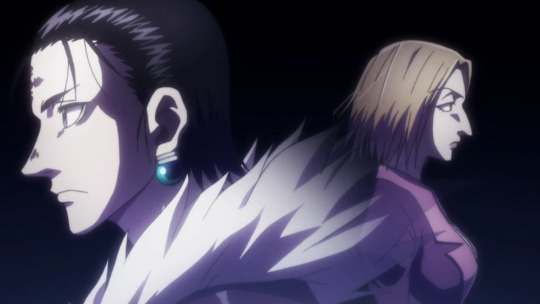
Sure, there are practical reasons why Chrollo is ignoring Paku. However, the framing highlights how far the two characters are emotionally too. Maybe the reason Paku chose that condition is because deep down she feared she could never reach Chrollo. And so she chose a condition that made so she did not really have to try. And yet, in the end she still made an attempt.
Thank you for the ask!
74 notes
·
View notes
Note
What do you think Sir Pentious’s arc will be in season 2 now that he’s in Heaven and far away from his friends and Cherri Bomb?
Hi!
First of all, thank you for your asks! I am looking forward to answer to them, even if I might take a while because it is a busy time :D
In any case, I will start with this one.
I think Sir Pentious's story has the potential to be important in two ways thematically.
1- Deconstructing the redemption by death trope

Sir Pentious sacrifices himself out of love. He risks his life to save both Cherri Bomb (romantic love) and his found family (platonic love). He fails, but his motivations were genuine, so he ends up in Heaven.
Now, this is already an ironic subversion of the "redemption by death trope". This trope has one character redeeming himself through death. His sacrifice (when well done) is usually pivotal in solving the main conflict. However, Sir Pentious accomplishes nothing. He is annihilated by Adam without being able to touch the archangel. All in all, our lovable snake demon has no impact on the fight, but to force Charlie to enter full-demon mode.
Despite this, Sir Pentious's actions have a HUGE impact thematically, as he proves a demon can be reborn into an angel. That said, is this really what redemption is like? Sure, Pentious did one incredibly selfless thing, but does it mean all his problems have been solved? Does it mean he can do no wrong? Does it mean Pentious's personal flaws, which landed him into Hell have been overcome?
Personally, I do not think so. (I also think the author said season 2 will give us a little bit of Pentious's backstory and why he ended up in Hell)
The idea that one good deed solves a person's life and makes so this person is automatically grown is simplistic. So, I am expecting Sir Pentious to be challenged to stay a good person in Heaven. Who knows? Maybe far away from the Hotel he might spiral in some old bad habits. This would be interesting because it would also show Heaven lacks a support system, which can stop people from getting worse. This might be what happened to Adam, by the way. He landed into Heaven, but there he grew worse. Sir Pentious might find himself facing a similar temptation.
2- Exploring what happiness truly is

Speaking of Heaven, Sir Pentious is meant to challenge the whole Kingdom. He is an exception nobody foresaw: a demon, who found love in Hell, died for it and was reborn as an angel.
On the one hand Sera is bound to be disturbed by this because Pentious brings chaos into Heaven's order.
On the other hand Emily might be challenged too. After all, Emily is the seraphim in charge of bringing happiness:
Sera: It's your position to keep them happy and joyful.
And yet, Emily's idea of happiness is as superficial as Charlie's:
'Cause every single day in Heaven is a happy day Welcome to Heaven, yeah
Sure, every day in Heaven is a happy day. Except that I am pretty sure many people are unhappy in Heaven:
Vaggie was unhappy in Heaven, as she was brainwashed by a cult and forced to kill innocents. She dislikes the place to this day.
Adam was unhappy in Heaven, as he could not find a stable partner nor a meaning to his life. He was consumed by his envy for Lucifer and dedicated his life to ruin the devil's. That is not what a happy person does.
Lute isn't happy in Heaven, as she is once again a brainwashed child soldier. She gives herself value through violence and is a mess of repressed feelings.
I also think many people whose loved ones are in Hell wouldn't be so happy to know about the exterminations. Let's consider Molly, for example. It's probable she wouldn't be happy to know her brother Angel might end up killed by Exorcists.
The series is asking what real happiness is like. Charlie thinks it can be found in Heaven, but maybe Pentious will show us the answer isn't as simple. He might discover he was far happier in a shitty old hotel with a bunch of misfits that lonely in Heaven.
These are my two cents. Thank you for the ask!
39 notes
·
View notes
Note
So if you're into Wicked, how does Nessa foil Glinda and Elphaba?
Hi!
Sure! As per usual this analysis is a patchwork between the movie and what I know of the plot of the play, so it might not be entirely accurate. Also spoilers, obviously.
Nessa is meant to be a dark foil to both Elphaba and Glinda.
NESSA AND ELPHABA
Both Nessa and Elphaba are reduced by others to a physical trait.
Nessa is nothing more than her disability. She is "the poor girl on a chair" that everyone tries to protect and must be kind to. Elphaba is instead the green ugly monster everybody avoids and is wary of.
The sisters are dehumanized, which is why they end up becoming the two Wicked Witches of Oz. Nessa becomes the Wicked Witch of the East, whereas Elphaba ends up as the Wicked Witch of the West. It is telling that both their titles make them nameless, in opposition to "Glinda The Good". By the end of the story, neither Nessa nor Elphaba are seen as people. They are just evil witches.
However, the prejudices they face are opposite:
Nessa is seen as frail, vulnerable and tragic. She is treated as a poor creature that must be handled with care. Her father, her teachers and her friends all treat her like this. Even Elphaba to an extent.
Elphaba is instead seen as malicious, evil and scary. Her father, Glinda, the other Shiz students all treat her like this. Even Nessa to en extent.
The difference is that Elphaba never truly gives in to the mask others force on her. She almost does in No Good Deed:
No good deed goes unpunished All helpful urges should be circumvented No good deed goes unpunished Sure, I meant well, well, look at what well-meant did All right, enough, so be it, so be it, then Let all Oz be agreed I'm wicked through and through since I can not succeed Fiyero, saving you I promise no good deed will I attempt to do again Ever again No good deed will I do again!
However, she is able to pull herself together and simply chooses to leave Oz to live peacefully with Fiyero.
Nessa instead ends up defined by the persona others decide for her.
It is subtle and done unwillingly at first:
Bock: Listen, Nessa? Nessa: Yes? Bock: Uh, Nessa I've got something to confess, a Reason why, well Why I asked you here tonight Now I know it isn't fair Nessa: Oh, Boq, I know why Bock: You do? Nessa:It's because I'm in this chair And you felt sorry for me Well, isn't that right? Bock: No! No! It's because, because Because you are so beautiful!
Here, Nessa is actually trying to fight Bock's prejudice. She thinks Bock asked her out because of pity and is ready to call him out. Tragically, though, it is this very remark, which prompts Bock to find Nessa pitiful. The result is his inability to be honest with her, which leads to their very tragic and one-sided love story.
In short, Bock is initially unable to leave Nessa because he does not see her as a person, but as an extension of her disability. It is this dehumanization, which plants the seeds for Nessa's later spiral. As a matter of fact, Nessa being treated as this "thing" to protect by all the people in her life makes her thirsty for love:
How do you think that feels? All of my life, I've depended on you And this hideous chair with wheels Scrounging for scraps of pity to pick up And longing to kick up my heels
Nessa ends up resenting her disability so much she reduces all her problems to it. This is made obvious in her last scene, where she reproaches Elphaba for never "helping her". Then Elphaba enchants her slippers, so that Nessa can walk. Nessa's reaction is of utter happiness initially. She calls Bock and is convinced he will finally love her for who she is. However, Bock sees the change as a sign he can finally leave her:
Bock: Nessa Nessa: Yes? Bock: Oh, Nessa Surely now I'll matter less to you You won't mind my leaving here tonight Nessa: Leaving?
This turn of events breaks Nessa's heart and prompts her to try to literally "steal" Bock's, but she ends up shrinking it instead. So, Elphaba is forced to turn Bock into the Tin Man to save him.
In short:
Elphaba never lets others reduce her to the color of her skin and never truly becomes "the wicked witch" others see her as. Moreover, she is loved by Fiyero for the person she truly is. Her actions unwillingly leads to him almost dying and she turns him in the Scarecrow to save him. Despite this, Fiyero keeps loving her and the two are together in the end.
Nessa ends up blaming all her problems on her disability, so once she gets "cured" she thinks everything will be fine. Once it turns out the root of her problems isn't her disability, but rather who she is as a person (aka her mistreatment of Bock and the other Munchkins) she is unable to cope with it. Moreover, Bock never loved Nessa and forces himself to stay close to her because of her inability to walk and his sympathy slowly changes into hate. By the end, Nessa almost kills him by mistake and Bock is turned into the Tin Man. Differently from Fiyero, Bock doesn't forgive Nessa and leaves her alone.
NESSA AND GLINDA
Both Nessa and Glinda are spoiled and never called out on their actions because of who they are superficially:
Nessa is seen as weak and meek, so people coddle her. Her father gives her everything, from his attention to his late wife's slippers. Elphaba is protective of her and always ready to put Nessa's needs above her own. The two sisters may be close initially. However, there is no doubt their relationship is asymmetrical. Elphaba is ready to satisfy Nessa's requests, is sympathetic towards her situation and overprotective. Nessa instead doesn't seem to care much her sister is facing discrimination for the color of her skin. If anything, she is said to be ashamed of Elphaba and the movie shows she is annoyed her sister is staying at Shiz, as it spoils Nessa's chance of a new life.
Glinda is seen as perfect because she is beautiful and charming. She is "popular" and has almost all of Shiz grovelling at her feet. As a result, she can easily present herself as the "victim" of Elphaba's bullying, when it is really the opposite. Not only that, but this dynamic gets deeper and more complex in the second part of the play. There Elphaba, who is the real prodigy fighting for the well-being of Oz, is hated as wicked. Glinda, who is unable to perform magic and has sold herself to the Wizard's propaganda, is instead celebrated as good.
As a result of this, both girls struggle with taking responsibility for their actions, until they are faced with a similar struggle: a broken heart.
Bock tells Nessa he loves Glinda and asks her permission to leave, so that he can finally pursue his true love.
Fiyero chooses Elphaba over Glinda and leaves after breaking up his engagement with Glinda.
Both girls are upset over this and end up lashing out against Elphaba.
Nessa uses magic to try and have Bock fall for her, she almost kills him and eventually blames Bock's transformation on her sister:
Nessa: Then what do we do?! This is all your fault! If you had not shown me that horrendible book
Nessa: It wasn't me! It was her! I tried to stop her! Bock, please, I still... It was Elphaba!
As a result of her actions, both Bock and Elphaba leave Nessa alone:
Nessa: Elphaba, please don't leave me! Elphaba: I've done everything I could for you and it hasn't been enough. And nothing ever will be.
Glinda is so upset by Fiyero's choice that she ends up suggesting using Nessa to get to Elphaba. What she doesn't realize is that Morrible is going to kill Nessa to hurt Elphaba. It is symbolically after this moment (and their iconic cat-fight) that Glinda truly realizes how deep she has fallen. It is after the death of Nessa, her dark foil, her shadow, that Glinda is eventually able to choose "goodness" and rushes to warn Elphaba of the witch Hunters coming after her. She even admits her share of responsibility and guilt in how things turned out:
And just to clear the air I ask forgiveness For the things I've done you blame me for But then, I guess we know there's blame to share And none of it seems to matter anymore
Thanks to this gesture, Glinda and Elphaba are able to reconcile and end the story as closer as ever.
Like a comet pulled from orbit (like a ship blown from its mooring) As it passes a sun (by a wind off the sea) Like a stream that meets a boulder (like a seed dropped by a bird) Halfway through the wood (in the wood) Who can say if I've been changed for the better? I do believe I have been changed for the better And because I knew you Because I knew you, because I knew you I have been changed For good
In a sense, Nessa is Glinda's cautionary tale. She is who Glinda risked to become, if she had not learnt to take responsibility for her actions in time. Nessa tragically fails to grow and spirals into wickedness. Glinda is instead able to grow and blooms into Glinda the Good.
THE WICKED WITCH OF THE EAST
Nessarose: Save him please, just save him My poor Boq, my sweet, my brave him Don't leave me 'til my sorry life has ceased Alone and loveless here Just the girl in the mirror Just her and me, Wicked Witch of the East! We deserve each other
And Goodness knows The wicked's lives are lonely Goodness knows The wicked die alone It just shows when you're wicked You're left only On your own Yes, Goodness knows The wicked's lives are lonely Goodness knows The wicked cry alone Nothing grows for the wicked They reap only What they've sown
Nessa's story-arc is tragic because it is the one that more than others fits the description of "wickedness" Glinda and the Ozians sing about in No One Mourns The Wicked. Sure, we can read Glinda's stanza as her singing about herself, as she is now alone. However, Glinda does manage to reconcile with Elphaba and is finally pursuing goodness, which will hopefully bring her more true love and companionship. Fiyero and Elphaba have left Glinda physically, but are with her spiritually, as the finale proves:
Glinda: Who can say if I've been changed for the better? But Elphaba and Glinda: Because I knew you Crowd: No one mourns the Wicked Glinda: Because I knew you Elphaba and Glinda: I have been changed
At the very end, Elphaba is still singing together with Glinda in her heart.
Nessa is instead left alone by everybody. Her father dies, Elphaba leaves her after a huge fight and Bock abandons her after coming to hate her. She is even indirectly killed by Glinda and she dies alone for real. The only consolation is that even in her case, it is not true "no one mourns the wicked". Elphaba does mourn her. Nessa may have become "the wicked witch of the East", but she is still Nessa, Elphaba's little sister, a person behind the "wicked". So, it turns out even the wicked is mourned. That is because every person has the chance to be much more than just "wicked" or "good".
36 notes
·
View notes
Note
I think Ice Queendom really grounded a lot of my WK headcanons and what it would mean for Weiss and Jaune in the canon timeline. The way they’re foiled in that show is one of my favorite additions.
They’re both dealing with their identity in a specific way related traditional gender roles and in a way that they think their family might want, and based on the knights/maidens they idealized in their families and from fairy tales. Jaune is afraid of not living up to this toxic masculine image of what he thinks a huntsman is meant to be like the men in his family he looks up to and this translates to a fear of being worthless. On the inside he’s a terrified child oppressed by his legacy and the disappointment/scorn of his family for being a liar and a coward.
In Weiss’s nightmare she projects the image of who she believes she’s meant to be (Ice Queen), while neglecting the other parts of herself she projects onto others. Like Jaune, she’s also still a terrified child in a way. She locks that part of her away because she doesn’t want to be vulnerable. But she also projects the gender normative standards of “Knights” and “Maidens” onto two other people in her dream - Jaune and Pyrrha.
Pyrrha is the ideal Maiden. She’s idealized in her dream world more than anyone else. She’s elegant and beautiful. She sings “Mirror, Mirror.” She essentially speaks to Weiss’s own deep-seated insecurity of not being able to live up to her standards of perfection. Pyrrha actually connects the pairing in her nightmare in a way not dissimilar to how she does in canon.
Jaune is different… as one of the dream NPCs he’s nothing special at all. But when Jaune himself comes into her dream world, he is decked out in a special cape and a giant sword that repels the Nightmare. But he is too weak to lift it. Weiss believes Jaune is too weak and unworthy of his weapon. It speaks both to Weiss’s opinion of Jaune as a person, but also to her own feelings about herself. She had to kill a knight to be free of her Father’s patriarchal prison. She had to essentially become her own knight to save herself (the princess) from her tower. But she also feels she is unworthy of her name unless she lives up to a certain standard, which is why she thinks lowly of Jaune here because he so clearly doesn’t, and why she foists that aspects of herself onto him in her nightmare.
But then why does Jaune have the sword? Because Weiss saw that Pyrrha (her idealized “Maiden”) placed her faith in him. So, as much as she denies it, Jaune has the potential to be a “knight in shining armor”, and some unconscious part of Weiss recognizes that potential. And that’s more or less the burden Jaune struggles to lift in the nightmare. He has the potential to be Weiss’s knight, but he’s not yet worthy. And this story isn’t about him. It’s when Jaune integrates with both the feminine (Pyrrha) and the inner child (the mini Weiss’s) that he can lift the sword to destroy the corrupted “knight” of Weiss’s father to be overcome to help free her from the nightmare. This, too, mirrors Weiss’s slaying of the Arma Gigas in the White trailer. And this is also what Weiss needs to do too to finally be free of the nightmare she’s stuck in. Both Weiss and Jaune need to integrate with those neglected parts of themselves to become the best versions of themselves. They do it a bit in the climax of Ice Queendom and maybe they’ll do it completely in canon too.
Hi!
I love this analysis, thank you for sharing it :D
I agree, the White Knight's foiling is one of my favorite details of the Ice Queendom anime!
I remember loving how the story
Juxtaposes Jaune's knightmare to Weiss's
Highlights how Ruby and Jaune are the people Weiss needs in juxtaposition with Pyrrha, as the one Weiss wants
Has Jaune find a relic, which highlights Jaune's potential to properly connect with Weiss in the future
Has Jaune fight together with Pyrrha and the mini-Weiss at the very end, which symbolically foils Arkos and White Knight :''')
I don't really have anything else to add to your beautiful thoughts!
Thank you for writing them!
40 notes
·
View notes
Note
Hi, just wanted to ask some RWBY (white fang) related question. I'd totally understand if you won't answer since it's been so long.
I feel a bit uncomfortable with how the show and some people in the fndm treat the White Fang and the faunus in general. While the 'appropriate' term for the White Fang are terrorists, they are also in a sense activists. It's a bit confusing for me (for years) the reason why rwby is saying that the White Fang are in the wrong for choosing violence to fight for their freedom against their oppressors, that choosing trust and love is the correct path. It's a different lesson that is ingrained in so many countries who are colonized. They fought their enemies, their oppressors, and was lauded as a hero. But rwby doesn't treat it that way. And I know it's supposed to be a fairytale-like story but they should have given a much more delicate touch to their writing of racism and oppression.
When I was watching RWBY, I was confused at first why the personal problems of Weiss Schnee, a girl who is abused by her father but also contributed to the oppression of the Faunus, is treated as the same level as the systematic oppression of the Faunuses. I just realized recently it's because Weiss Schnee's progression is white-person coded. Not that it's bad, but in a sense that it focuses more on the individual rather than a tight-nit dynamic that is prevalent within a lot of non-white cultures. (I am no way treating this as the truth, just my observations and feelings as a south asian person.) There's nothing wrong with the individualism that the west is known for but it's different than the familial dynamics common here in asia.
I guess that's why I am very upset with the handling of the White Fang and the Faunuses. Especially when some people in the fndm say that 'the White Fang are the outlier, there are faunus protestors who do it peacefully'. And it's enraging to me. Is the White Fang's anger not justified? Why are their violent actions vilified while the peaceful ones are relegated as the ideal protestors? Forgive my language but it reeks of how white people used to infantilize their colonies by promoting the ideal Chinese Man, Indian Man, Filipino Man, etc. By saying that these type of actions are humane, a sign of intelligence, unlike their savagery and barbarism (meaning showing violence and anger towards the colonizers). I used to think like that too, I was young though and still influenced by colonial mentality.
I guess what I want to ask is if there are any ways to properly handle the White Fang's, Blake's, and the Faunus' storyline? I'm sorry for ranting, I got a bit passionate there.
Hi!
No problem, I still love RWBY a lot and I always love answering asks on it :D That said, I do not have much to say on the topic except that I understand and I think your feelings are 100% valid. I actually think it is a common criticism to that particular plotline tbh.
Personally, I do not have a personal problem with it, but I do understand the criticism and I think a lot of poc (and probably many non poc too) agree with you :)
As for how to handle the plot differently... my humble opinion is that there is no way to handle this specific plotline, so that it offends no-one. It is triggering in nature and I think that to handle it with the care it needs, we would have needed a whole story dedicated to it, which RWBY can't be. I also think they could have played it safer initially and condemned Weiss's racism more. They do so in The Ice Quendom's anime, for example.
That said, I am personally happy they did not play it safer. This is an unpopular opinion, but I think a flawed and problematic story can be more interesting than a perfect one, when done in good faith. The framing they used in the beginning especially would not be acceptable today, but I think that maybe accidentally they ended up giving us a pretty realistic portrayal of the characters. Not perfect caricatures with unproblematic or schematic reactions, but real people:
-Blake is 100% in the right about the systemic exploitation and calling out Weiss's racism. However, she herself is a traumatized teenager that even more so than trying to solve a systemic issue needs to overcome the personal abuse Adam subjected her to. So, the moment her new friends discover she used to be part of a group they consider as criminal and violent she runs away instead than explaining herself. She isn't in the wrong because she was part of the White Feng, but because she disappears without facing her team. In short, she gives in to her flaw. Blake can't make a convincing case for the Faunus until she heals herself and understands how she wants to fight. It is only after she finds in herself the strength to fight and defeat Adam that she can focus on a better way to change people's opinion on Faunus.
-Weiss is 100% in the wrong about her discrimination of the Faunus, but she can't see it. Not only that, but when confronted about it she makes a systemic issue all about herself. In short, she is Blake's opposite. Blake thinks she needs to fix society by herself, to the point she should sacrifice her personal feelings for it. Weiss instead makes society all about her personal experience and her personal feelings. She is acting as a mouthpiece of her father and needs to snap out of it. However, it is a process that does not happen overnight and she takes time to overcome abuse and racism. She does thanks to being exposed to a more diverse environment and by the time of volume 8 she is fully conscious of the pain she and her family caused to the Faunus. She apologizes to Blake and knows her personal situation was no excuse for her racism.
-Ruby and Yang are instead neutral, which I think it is something people criticize. To me, however, it works to convey how ignorant they are on the matter. Both sisters are not prejudiced against Faunus, but they also do not seem to be that much involved into the problem. They do not have close loved ones that are Faunus before meeting Blake and Velvet. They are not part of the minority and even if they do not resent it, they are still passive in the matter.
In short, the dynamic portrayed is that of a group of friends who is mostly composed by people who are the majority. Blake, a member of the minority, finds herself struggling because she is unsure how to convey her feelings and her point of view. That is why it is so important for her to have Sun to relate to. And even then, Sun's experience as a Faunus is very different from hers, but he still helps her sort out her feelings. They can relate to each other in a way Blake can't with team RWBY because their cultures are simply different. In the end, however, Blake goes back to her team, who accepts her and we are shown the team grows progressively more sensitive to the Faunus's problems. In short, theirs is a mini story of integration, which might have been depicted this way by accident, but it still rings plausible to me.
As for the bigger systemic issue, the thing with RWBY is that the Faunus's discrimination is not supposed to be solved only through the Faunus's struggle, but rather by the world dynamic changing and by the people coming together. Specifically, Blake can't fix the Faunus's problem alone, but she needs Weiss's help.
I have discussed their parallel arcs in these metas:
This is definately not a narrative everyone would relate to or appreciate. I think this is fair, but it is definately the one, which works the best for RWBY's themes and Blake's character imo. Blake is a character that starts out thinking she has to handle everything on her own, so that her loved ones won't get hurt. Still, this goes against the point of her fairy tale: Beauty AND Beast. Two characters, two opposites, two sides coming together and integrating. Blake needs others to complete her story. Both on a personal level (Yang) and on a societal level (Weiss). Just like Blake doesn't have to face Adam alone, she doesn't need to change society on her own. Blake and Weiss aka her two beauties are there to help her. And this I think is a beautiful theme for a character, who started the story overwhelmed by the weight of the world.
In short, I think your dislike of the plotline is 100% valid and understandable. I also think this is the kind of story RWBY is and initially the topic was approached a little clumsily. In the end, it is up to you to decide if you can still like the overall story despite this plotline or if this plotline is too much of a dealbreaker for you :)
Thank you for passing by and I am sorry if this answer was not of much help!
20 notes
·
View notes
Note
What do you think so far of season 2 of Arcane ? Honestly I think for my part that it’s too rushed and there are too many storylines it’s so confusing. Besides they completely destroyed Vi and Caitlyn relationship lol the disappointment is high
Hi!
I am sorry you are not enjoying the season very much. On my part I am loving it and I am looking forward to the final act!
I think much criticism I have seen stems from the very own premise of Arcane as a show tbh. I think there are two things to clarify.
First thing to clarify
Arcane is in the end a League of Legends show. Its main commercial goal is to explore the Lore of the Game, so that new fans can be brought in and old fans can have fun spotting easter eggs. As a result, it takes some choices that in another story you wouldn't have. Two examples:
1- Mel's arc feels out of the blue, but it ties into the lore of the game (I heard they wanted to make Mel into a new champion? If so, she is probably going through an arc where she is receiving magical abilities, as smart as fuck and good at politics isn't exactly a set skill that works in LOL). It is a storyline you would not usually add, as you would not usually add the Black Rose shenaningas. They added it because it probably lets them add a new champion to the game and it lets them play homage to another popular character of the game. That said, Mel's own storyline has the potential to tie nicely with the main plotline:
a) Mel's disappearance does in fact have an impact on the narrative, i.e. it lets Medarda do as she pleases in Piltover. If Mel were around, there is no way she would have let her mother establish Martial Law without a fight. I think Mel could have also had a positive influence on Cait. Not only that, but Medarda's love for Mel humanizes her character and gives more depth to her relationship with Caitlyn. It is obvious Medarda and Cait's bond is one where they are projecting on the other a loved one. Cait finds a new mentor figure/mother after Cassandra's death. Medarda finds a new mentee figure/daughter after Mel's disappearance. They are not mother and daughter, but they project on each other a need they both feel, as they are both grieving.
b) Mel has always been linked to Jayce and Viktor's B plot aka Arcane plot, as she, Viktor and Jayce are the ones who created HexTech. This season Viktor and Jayce have both "touched" the Arcane, which has traumatized them in opposite ways. In a sense, they have both lost their humanity in the pursue of progress. Moreover, they have both become entangled with magic. Well, even if I know very little of LOL Lore, I think it is safe to assume Mel inherited some kind of magical ability. The fact she is trapped in some kind of magical dimension where she has to decipher old runes makes me believe her experience is not very different from Viktor and Jayce, thematically. They all pursued progress through science, only to now face something of wild and irrational. Also, Mel being the one with the higher magical potential among the trio could be pretty interesting.
2 - I would not have wanted Vander to come back in any other series and was skeptical about the choice of having him be Warwick. That said, I also understand it makes a very interesting background for the champion, so I understand why they made this decision. What's more, I actually like a lot how he has been used. Instead of being reduced to a simple agent of chaos, he has been used as a catalyst in Vi and Jinx's arcs.
Basically, they are taking choices, I would not recommend in any other story. However, they are making them work pretty well both for Arcane and for LOL.
Second thing to clarify
It is true Arcane is an ensembled cast and it balanced different pov rather well in season 1. However, this does not mean that ALL characters have the same importance. I think both season 1 and this season so far have made very clear that the story has ONE main character, that is Jinx:

She is the one given the major focus BY FAR.
The whole first season is her journey to become the Jinx in the games, which is symbolically why the season ends with her embracing this alterego. Every other major character's plotline in the main A plot is after all tied to her. Vi wants to save her. Silco wants to control her. Caitlyn wants to arrest her. She is the reason why Cait and Vi meet each other in the first place. Not to count she also unwillingly kicks off the B plotline by having Jayce's research come to light.
The second season so far has revolved around her, as well. This time she is going through a journey, where she tries to fix what she has broken. At the same time, she has to accept the consequences of her own actions. She grieves Silco, connects with Sevika, adopts Isha and tries to mend her relationship with Vi. Meanwhile, all the other major characters are impacted by her. She is at the centre of the conflict between Vi and Cait, for example. She is the one who almost kills Viktor, so that Jayce tries to resurrect him. Finally, she becomes the centre of the major conflict between Piltover and Zaun.
In short, I think it is fair for people to be annoyed their faves are not receiving the screentime or focus, they had hoped. However, I think that so far the series has been coherent in keeping Jinx at its center. We'll see if it will be so for the ending, as well.
Finally, I don't think Vi and Cait's relationship was ruined. I think the conflict among Vi, Cait and Jinx is actually my favourite part of this season. I will add that their conflict is actually a mirror of the first season:
Season 1 has the first act focused on Vi's relationship with Powder and it ends with their separation / Season 2 has the first act focused on Vi's relationship with Cait and it ends with their separation
Season 1 has the second act focused on Vi and Cait's relationship, as Vi looks for her family / Season 2 has the second act focused on Vi and Jinx's relationship, as they look for their family. Both relationships start as conflictual and slowly grow better
In season 1's third act, Vi fails to reconcile her relationship with Cait with the one with Jinx. We'll see if in the final act of season 2, she will fare better.
In short, it has never been only Vi and Cait, but always Vi, Cait and Jinx, as her lover and her sister represent two different sides of Vi. Just like Jinx has to reconcile both Jinx and Powder, so Vi has to reconcile both Jinx and Cait. Similarly, Cait needs to reconcile Vi and Jinx as two parts of Zaun.
In conclusion, I do agree that there are a little bit too many storylines, some of which might feel out of the blue. I also understand people wanted some characters to be explored more. However, I also think they are doing a great job at telling the story they want to tell and they are giving the viewers all the elements to understands the characters' developments. Surely, it would have been great to have some dynamics and psychologies explored more, but the writing level stays pretty high.
This does not mean you should like it, though. You probably were more interested in some dynamics and storylines that ended up being sidelined and it is totally valid to be annoyed by it.
Thank you for the ask!
38 notes
·
View notes
Note
what do you of Charlie as a main character, her development through season 1 , and how her development will continue in season 2 now that Sir Pentious is in heaven and the Vees being the main antagonists.
Hi!
I looooooooooooooove Charlie <3 She is my second favorite character in the whole Hellaverse (after Lucifer) and I think she is one of my favorite protagonists ever.

As a main character, I like her for three reasons.
Charlie is at the centre of her story. I HATE when the story tells us the protagonist is important, but they end up having no impact whatsoever. Charlie is instead very active and shapes the conflict, in both good ways and bad ways. She comes up with the Hazbin Hotel project, she goes to meet Adam, she has the idea of speaking with Sera. It is her passion, which inspires both Angel and Pentious to try to be better. It is her bravery, which irks Adam and has him target the hotel. It is her and Vaggie, who find a way to protect Hell. Basically, you take Charlie away, the story disappears.
Charlie is very flawed. The second worse thing after a protagonist who does nothing is a protagonist who is always right. Thankfully Charlie is a disaster. She fails to both listen to others and to express herself. She wants to redeem people, but has no idea how. She doesn't understand neither others nor herself. Even when she is right, she is so for the wrong reasons. Charlie is a person with a lot of potential. She is powerful, inventive, charismatic, smart and determined. And yet, she fails to capitalize on all these talents because she doesn't wanna face the negative things about herself and the world. She is Miss Repression.
Charlie is a complex character. In fact, I think she is more complex than people give her credit for. A good example of this is her motivations. Charlie has two reasons to pursue her Hazbin Hotel Project:
She wants to save the sinners and to build a better Kingdom (selfless reason) > external journey
She wants to matter and to be needed by others (selfish reason) > internal journey
A good way to understand this double journey is to look at Charlie's two major inspirations.
CHARLIE = RAPUNZEL + JACK SKELLINGTON

Design-wise Charlie is a mix between Disney's Rapunzel and Jack Skellington.
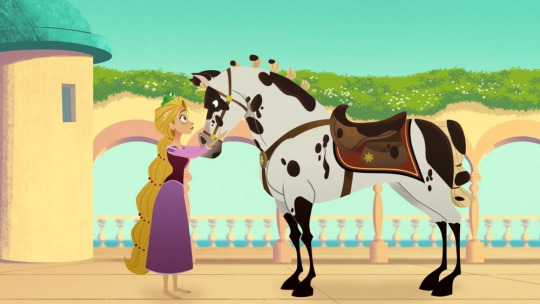
Both Charlie and Rapunzel are blond princesses that wear their hair tied into a long braid. Not only that, but their hair is linked to their inner magic:
Rapunzel's hair is associated with the sun, so it can both heal and explode into a beam of light.
Charlie's hair is a metaphor of her feelings. She usually represses her emotions, so her hair is restrained. However, when she enters her demon form and unleashes her power, her hair gets untied.

Both Charlie and Jack Skellington are tall, white, humanoid demons, who wear tuxedos with bow ties. Charlie's allusion to Jack is even made official in some arts:
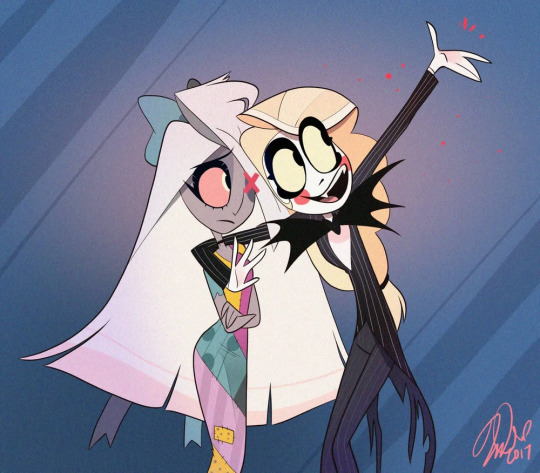
So, Charlie looks like both a Disney Princess and the Pumpkin King. What about it? Well, the point is that the Princess of Hell doesn't just look the part, but shares deep similarities with both characters.
Charlie is a (tame) deconstruction of the Disney Princess archetype. She is a princess, who is cheerful, optimistic, selfless, good to the bone and likes singing. So, everyone loves her right? Wrong. The world around her isn't as easily impressed by her spirit, but misunderstands it and mocks her. So, Charlie is basically Rapunzel if Raps were met with a cynical world the moment she escaped the tower:
He's got a dream He's got a dream See, I ain't as cruel and vicious as I seem Though I do like breaking femurs You can count me with the dreamers Like everybody else I've got a dream
Inside of every demon is a rainbow! Inside every sinner is a shiny smile! Inside of every creepy hatchet-wielding maniac, Is a jolly, happy, cupcake-loving child!
Rapunzel enters a sinister inn, shares her personal dream and is validated and understood by a bunch of bandits. Charlie explains her well-meaning goal to all of Hell and is humiliated and laughed at by everyone.
Charlie is a Disney Princess in Hell, who wants to grow into a leader who inspires others. However, it does not come easily to her, like it does to Rapunzel.
Charlie's external journey is a deconstruction and reconstruction of the Disney Princess archetype. Which struggles must a Disney Princess face in Hell? How can a Disney Song get through literal demons? How can Charlie maintain her idealism in the hellish world she is in?
Charlie and Jack face very similar struggles. They are the royals of a Kingdom full of fear, screams and pain. However, both are tired of it and decide to change it:
Jack wants to bring Christmas (warm, joy and goodness) in Halloween Town
Charlie founds the Hazbin Hotel to redeem sinners, so those people the universe itself has dismissed as lost
The intentions are good, but Jack and Charlie are not completely selfless, as they pursue them.
This is clear for Jack. The Pumpkin King is forcing Halloween Town to embrace a twisted version of Christmas, so that he can fill his existential void. Deep down Jack wants to change, but he embraces a superficial transformation (Sandy Klaus), instead than a deeper one (Sally).
Charlie is the same, even if she might not look like it. The Princess of Hell wants to redeem sinners, so that she can redeem her parents and so her very existence. She wants to make Hell a better place, sure. However, she wants to do so to prove she has value. Similarly to Jack, she is also superficial in her methods. Jack thinks all he has to do to understand Christmas is to color himself red:
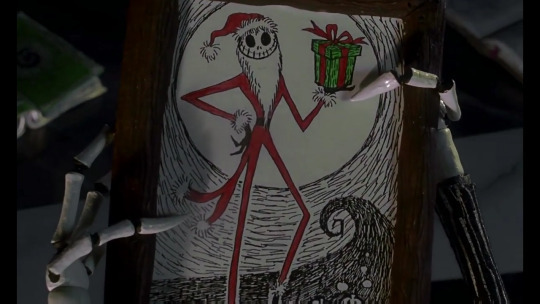
Charlie thinks all she has to do to save others is to give them hugs and fluffy clouds:

Both look for superficial solutions to deep internal issues and complicated societal problems.
Charlie's internal journey is similar to Jack's. Both struggle with their most vulnerable and hidden parts (their shadow), wear masks (personas) and grow thanks to romantic partners (their animus/anima).
CHARLIE = A NEGLECTED CHILD
As a character, Charlie's two main inspirations are Rapunzel and Jack Skellington. As a person in-universe, Charlie's two main influences are Lucifer and Lilith.

Charlie is a mix of her parents, both physically and psychologically:
She looks a lot like her father and has inherited his idealistic disposition and love for dreams
She has long golden hair like her mom and wants to become like her and inspire others with her songs
What's more, it is obvious her parents are the driving force behind many of Charlie's actions. Deep down the Princess of Hell is nothing, but a child from "divorced parents". As a result, she exhibits many traits that can be tracked back to Lucifer and Lilith's separation and neglect.
Charlie deeply misses her family and she is unconsciously trying to get it back. This is why she chooses to establish her Hazbin Hotel in a decadent building, which is full of family pictures and of symbols linked to her parents. Even the room she shares with Vaggie was obviously Lucifer and Lilith's:
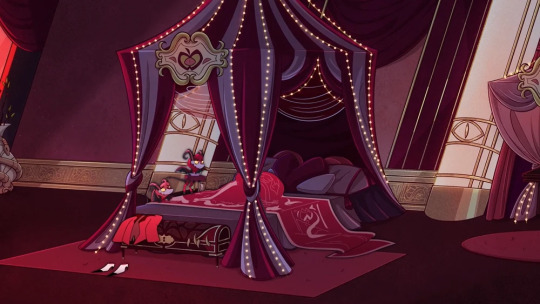
This choice has a double meaning. On the one hand it represents Charlie's willingness to restore her parents' dream. On the other hand it is a hidden desire for her family to come back to her. Fully healed and together.
Her issues go deeper when we look at Charlie's relationship with both her parents. Lucifer and Lilith share similar positive traits- they are both charismatic and fierce dreamers - and negative traits - they have both been neglecting Charlie. However, Charlie has compartmentalized her feelings for both in a specific way:
She blames all her parents' misdeeds on Lucifer. She is quick to justify Lilith leaving for 7 years. However, she openly calls out Lucifer's coldness and neglect.
She projects all her parents' positive traits on Lilith. She sees her Hazbin Hotel project as a way to honor Lilith's legacy, but episode 5 makes clear her dream is strongly inspired by Lucifer too.
Essentially, Charlie sees the world in black and white and this is true for her parents too. Despite this, many things do not add up. For example, she says she admires mostly Lilith and is not close with Lucifer at all. However, the way she looks suggests something different.

Some people pointed out that as a teen Charlie used to dress more feminine, like Lilith.
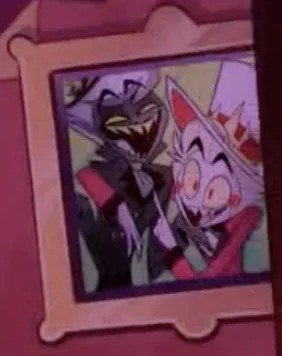
As a young adult, Charlie wears more masculine clothes. Not only that, but her jacket strongly resembles Lucifer's one in his youth.
In short, Charlie says she looks up to her mom, whereas she is estranged from her dad. However, she also tries to resemble her dad and season 1 reveals how much she loves him. I would not be surprised if season 2 were to go deeper into her probably contradictory feelings towards Lilith.
Finally, I wonder what Charlie's feelings are when it comes to Lilith and Lucifer's original sin. After all, Lilith and Lucifer are the ones who brought evil into the world and I doubt such a moral person like Charlie is untouched by it. I wonder if her determination to save Sinners partly stems from some kind of guilt or shame she feels towards her family. It is as if she is trying to redeem her parents' forbidden love and so her own birth:
Charlie: Don't worry, Mom. I'll make you proud.
She wants her parents to be proud of her, but maybe she too wants to be proud of her family.
CHARLIE'S ARC IN SEASON 1
Charlie has both an external journey and an internal journey. How do they play out in season 1?
Internal journey
I have discussed Charlie's internal journey in season 1 in several metas. In short, the two key characters for Charlie's development in season 1 are Lucifer and Vaggie (yes, Angel and Alastor are pivotal too, but I am simplifying things here):

Lucifer challenges Charlie to see positive traits in others. She initially thinks of Lucifer in a negative way. However, after their shared song Charlie becomes able to understand her dad more and sees his hidden light. This realization makes her more self-confident and ready to face a new challenge in Heaven.

Vaggie challenges Charlie to accept negative traits in others. Charlie sees only Vaggie's positive qualities and ignores her flaws. However, after she discovers Vaggie's past as an exorcist she is forced to confront her girlfriend's repressed shadow. This realization has her face her own inner problems and helps her grow.
In other words, Lucifer and Vaggie help Charlie get more in tune with different parts of herself, both positive and negative:
Lucifer helps Charlie express her potential. By showing to his daughter a more positive part of himself, he gives her hope. Moreover, he acknowledges her dream and talent, so Charlie grows determined. As a result, she is more direct as she faces both Sera and Adam in Heaven.
Vaggie forces Charlie to face her vulnerability. By showing her girlfriend a negative part of herself, Vaggie breaks Charlie's coping mechanism. As a result, Charlie struggles with some of her repressed issues and grows. This is why Charlie can express her negative feelings more openly after her fight with Vaggie.
So, Lucifer and Vaggie do not only help Charlie in her inner journey, but accompany her in her external one, as well.
External journey
Charlie's external journey is her evolution into an effective political leader. A good way to summarize it is to use Charlie's songs.
Inside of Every Demon is a Rainbow/ Happy Day in Hell


Charlie's first songs both work as a starting point of her arc.
Both describe Charlie's objective:
There'll be no more fire, And no more screams Just puppy dog kisses, and cotton candy dreams And puffy-wuffy clouds, you're gonna be like "Wow!" Once you check in with meeeee~!
Charlie: If I can show them the dream I've dreamed That any soul can change! Vaggie: Those angels' minds are hard to change Charlie: Then they will know everyone can be redeemed From the evil to the strange! Vaggie: They're bloodthirsty and deranged!
Charlie wants to bring happiness in Hell, but she herself does not really know her people, so she fails.
Inside of Every Demon is a Rainbow shows it directly. Charlie sings to the Sinners calling them "cretins, sluts, losers" and she tries to force her feelings on them. Well, it does not work very well :P
Happy Day in Hell shows it indirectly. Charlie sings about Hell and mentions two places (Cannibal Town and the Porn Studio). She speaks of them fondly, but later on we discover she knows them very little. Moreover, she refuses to listen to Vaggie and ignores that everybody else does not match her song. She sings about today being a happy day, while the people around her suffer.
So, in the beginning Charlie is just terrible at communicating. This is brought up even in the song Hell Is Forever, where she fails both to pitch her hotel and to fight Adam's narrative.
It Starts With Sorry & More Than Anything
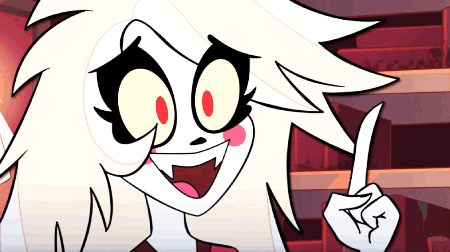

As the series goes on, Charlie starts getting through to people. She starts with:
Sir Pentious - He is the first Sinner Charlie convinces to join her Hotel onscreen. She gets through to him by forgiving him and believing in him when no-one does. The Vees consider him a failure and Vaggie and Angel are ready to attack him. Pentious himself is about to give up. However, Charlie doesn't and she inspires him to truly join the project. Charlie has her ideals tested and succeeds.
Lucifer - He is a person Charlie loves and deep down admires. So, it is extremely important that Charlie manages to get through to him. Charlie manages to express some of her deepest feelings. She shows Lucifer her real self and is rewarded.
You Didn't Know
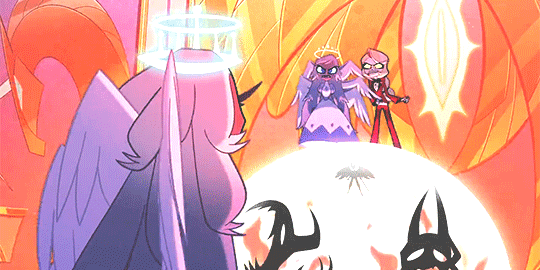
Thanks to her successes, Charlie grows confident enough she can openly challenge Heaven. What's interesting is that if in Hell Is Forever Charlie lacks a retort, here she finds one:
Charlie and Emily: If Hell is forever, then Heaven must be a lie If angels can do whatever, and remain in the sky The rules are shades of gray when you don't do as you say When you make the wretched suffer just to kill them again
She is able to finally tell Adam off and to counter his philosophy.
Ready For This
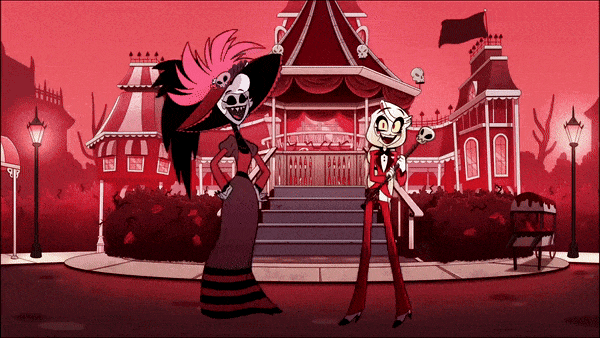
After facing her "political rival", Charlie is asked once again to inspire her people. Charlie herself is not particularly sure she is gonna succeed:
Rosie: Well how do you normally explain your hotel? Charlie: By singing. But that never works.
However, she pulls it off. The reason behind her success is that she behaves differently from Inside of Every Demon is a Rainbow:
Charlie: Have you ever wanted something That was so clear in your mind that you could taste it? Susan: You mean like human flesh? Charlie: Uhh, sort of.. It's a feeling like a rumbling in your gut That you could finally be faced with A billion needy faces, I guess what I mean to say is For the first time in my life I might have to be ready for this Ready to be the one who's leading from the front Gotta come into my own Gotta come into my throne Gotta take charge and defend my only home And although I kinda feel unsteady Now I need to be ready for this
She doesn't put her feelings and her dream in the spotlight. Rather, she addresses the cannibals in a way that they can empathize with her and understand where she is coming from. In this way, she makes the first step towards truly becoming a good leader:
Charlie: That's a start! 'Cause right now, we need a leader And it seems to me that Destiny has picked me to be that If you'll permit me So who's with me?
Finale

The Finale is a reprise of Happy Day In Hell. However, there are two main differences.
1- In Happy Day In Hell Charlie sings alone, whereas here Lucifer starts the reprise:
Lucifer: Come on little lady, why the frown? In the last 10,000 years You're the first one to change this town You can do this, now I know it! For your story has just begun You can't quit now. Hell, you owe it! There's still damage to be undone You've changed my mind, you've touched their hearts Found the good in souls gone bad The stage is wrecked, the crowd is gone But by God, Charlie! The show, it must go on! Everyone: We can do this We can build it Best hotel that you've ever seen! Twice the bedrooms, we can fill it Lucifer: With more sinners than you can dream! Lucifer and Vaggie: It starts with you, Lucifer, Vaggie and Angel Dust: You know it's true, Everyone: Fulfill your destiny!
And Charlie's loved ones all join in. So, Charlie might not have managed to inspire all of Hell, just yet. Still, she has found a small group of people who support her and are ready to sing her song.
2- In Happy Day In Hell Charlie naively thinks Hell can be fixed in a day (today is gonna be a happy day). Here instead she has accepted time is needed:
Everyone: We can do this (Charlie: We can do this) We'll be better (Charlie: We'll be better) Though redemption may take a while (Charlie: Though it may take a while) Wayward sinners, clear their ledger
So, tomorrow is going to be a happy day in hell.
In short, Charlie goes from a simplistic girl unable to communicate to a more mature adult in tune with her and others' emotions. Sure, she still has a long way to go. Yet, she has made a first step in the right direction.
HAZBIN HOTEL SEASON 2
We don't know how season 2 is gonna play out. However, we can do some hypothesis.
Internal journey
Season 1 focused on Charlie's relationship with Lucifer. The bond starts as strained, but it gets better throughout the season. It is possible season 2 will focus on Charlie and Lilith's relationship. After all, Charlie puts her mom on a pedestal, but all pedestals must break for a child to grow.
I also wonder if Pentious will work as a foil to Lilith, like he is to Lucifer.
It is no secret Sir Pentious and Lucifer are foils in season 1. Both are the convinced by Charlie to support their project. Both have a snake motif. Both are pivotal in the final fight. Lucifer falls from Heaven because of love, whereas Pentious rises to Heaven because of love.
At the same time, season 1 ends with a strong parallel between Pentious and Lilith. Both are two people Charlie misses and they are both in Heaven. From the little teaser with Buxter, it is also obvious Charlie is not dealing with her grief over Pentious well. It is possible her repressed feelings over Pentious's death might mirror her pain over Lilith leaving. Finally, Pentious and Cherri are a couple separated by Heaven and Hell. They might work as interesting foils to Lucifer and Lilith.
External journey
Season 1 focused on Charlie's political battle against Adam, as an example of a conflict between two Kingdoms (Hell and Heaven). Season 2 is gonna focus more on the Vees as antagonists, which means we are gonna explore more The Pride Ring's inner politics. This means Charlie will be tested as a leader in her own home turf.
In general, the story has made it very clear the Vees are negative foils of the Hotel Crew. The current situation in the Pride Ring is that the Ring is divided in an endless battle among Overlords. In particular, the Vees are a new generation of Overlords (hence their links to new medias), who want to take over after the old generation (Carmilla, Zestial, etc.)
This is why Velvette tries to provoke a fight with Heaven. She knows that if Hell goes to war, there is going to be a huge shift in the power balance in Hell. Still, her ulterior motifs are obvious and Carmilla and Zestial see through her. So, Carmilla refuses to give Velvette the information she needs. However, the Weapon Dealer is much more open with Vaggie because the exorcist is much more selfless and honest. In short, Velvette and Vaggie are foils when it comes to Carmilla and their foiling mirrors a broader juxtaposition between the Hazbin Hotel and the Vees. In short, Hell does need a new leadership, but it will be Charlie and her crew who will rise, not the Vees.
This is made clear in the foiling between Vox and Charlie, which starts in episode 2. There Vox is quick to dismiss Pentious once he fails. Charlie instead welcomes Pentious in, despite his mistakes. The two leaders have opposite ideas when it comes to people. Vox sees them as assets, Charlie sees them as individuals. These different approaches show throughout the season.
Vox states he will protect the people of Hell at the beginning of the series:
Reporter: Mr. Vox! What are your thoughts about the new extermination deadline? Vox: My dear people! We at VoxTek Enterprises have always been at the forefront of innovation. And now, with this new oncoming threat, we are shifting our focus, to your protection. We are pleased to announce- VoxTek Angelic Security is coming soon! Trust us, with YOUR safety.
However, by the end he is watching the fight safe on a sofa:

The one who truly fights for the people of Hell is truly Charlie:
Charlie: Tomorrow, the Exorcist Angels will face a Hell ready to defend itself and win! Vaggie: Yeah! Yeah, we will! Tell 'em, baby! Charlie: Yes! And we are-we are going to win! But in case we don't, I want you all to know... that getting to know you has been the biggest honor of my life. Whatever redemption really means, I know you all tried. I have seen the good in all of you. And it's...I-I'm just...I love you all, so much.
And she manages to stop the exterminations and to save Hell.
I am expecting season 2 to explore these opposite factions and their foiling more.
These are my thoughts for now. When it comes to Charlie, we could discuss much more about her motifs, like the apple one, the religious one and how all the people in the Hazbin Hotel embody a specific archetype to help Charlie grow. However, this post is already enough long as it is :)
Have a nice day and thank you for the ask! Also, sorry for the long wait!
22 notes
·
View notes
Note
What do you think of Stolitz as a ship? What do they offer each other in the story in terms of growth, and what does their relationship contribute to Helluva's themes?
Hi,
I love Stolitz as a ship! I think their dynamic is very well written and original. Here come my thoughts on it.
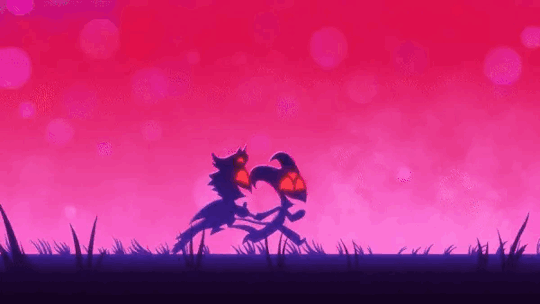
THE CIRCUS
The episode The Circus clarifies what Stolas and Blitz's dynamic is and how it came to be.
Stolitz is a relationship where mutual attraction and care is poisoned by self-hate and classism. This is shown in Blitz and Stolas's first meeting, where:
Paimon buys Blitz as a playmate to Stolas, so that he does not have to deal with his child's emotional turmoil. He also tells Stolas not to bow to Blitz because his social standing is higher.
Cash sells Blitz out and guilt-trips him by using Blitz's mother as leverage. He also forces Blitz to steal from Stolas by insisting it is alright to do so because all Goetias are bad.
So, both Paimon and Cash enforce on their children two ideas:
Stolas and Blitz are worth something only if the family benefits from them. Stolas has value if he marries Stella and gives a heir. Blitz is good if he puts himself in danger and steals from the nobles.
Goetias and Imps should not mix and should not treat each other as equals. Goetias are rich fuckers and Imps are inferior masses.
In general, Stolas and Blitz internalize that relationships, especially inter-class ones are transactional. Stolas can't just go and befriend Blitz, but his father needs to buy him. Blitz can't just go and have fun with Stolas. He needs to steal from him.
Fast forward to when Stolas and Blitz meet again as grown-ups. They immediately rekindle their relationship, but they do so by imitating their respective parents:
Stolas buys Blitz's affection by using his status as a Goetia (his grimoire)
Blitz takes advantage of Stolas's attraction to him, so that he can manipulate Stolas and steal the book
In short, nothing has changed since they were kids. They are now free from their fathers, but they approach relationships the way they were taught. Deep down neither believes they have any value unless they make the relationship transactional. Hence the grimoire/book deal seems as the perfect solution for both. At the same time, both Stolas and Blitz have inter-class prejudices. These biases are challenged by a character that is a dark foil to both. Who is that?
He's galloping over the dusty planes Even the cacti know his name If you don't want to die don't cross his path The best assassin in the ring of Wrath He's Striker! He's Striker! Sure shootin', darn tootin', his name is Striker
STRIKER

Striker calls out both Blitz and Stolas on their inner classist biases, but he does so in different ways.
In the Harvest Moon Festival, he tempts Blitz to give in to his darkest side:
Striker: Blitzo, come on. You know, the two of us are superior than most of our kind. And you were so above suckin' on a disgusting, rich, pompous Goetia, only to sneak topside for scraps and work for bitter sinners, who could care less who you are, when you could be slaying Overlords.
In Western Energy he tells Stolas point blank how Goetias are hated because they steal from others:
Striker: Look. Not every ring is some fancy-ass city, with some fancy-ass mansion, that only fancy-ass royals get to live in. Some of us have hard lives to live. And some of us have everything we care about taken away by fuckers like you.
Blitz and Stolas have opposite reactions to Striker's challenge.
On the one hand Blitz is disturbed by Striker because he deep down sees how similar they are. After all, both are Imps who refuse to accept their place in the hierarchy. Blitz opens his own business, whereas Striker targets higher demons. Moreover, both are hitmen. It is just that Blitz operates on Earth, while Striker operates in Hell. So, Striker's anger towards Royals and society is something Blitz feels too. It is something that could get the best of him:
Stolas: You speak just like that vile Striker friend of yours.
On the other hand Stolas is disgusted by Striker because he forces him to face something Stolas himself does not aknowledge. Striker strips him of his powers and shows him how much the lower classes resent him and the other Royals. Striker tells Stolas directly that Goetias hurt him and stole everything he had. Despite this, Stolas fails not only to show any sympathy, but also to aknowledge his own biases:
Stolas: I don't look down on you! How many times do I ha- When have I ever?!
In other words, Blitz openly embraces classist ideologies and consciously projects them on Stolas. He uses them as an excuse to backpedal on their relationship:
Blitzo: Point is, royal demons don't give a shit about guys like us. They're all the fuckin' same.
Stolas instead does not realize his own classist bias and thinks that just because he cares for Blitz and admires him, his classism has no impact on their bond. Except it clearly has:
Stolas: As shocking as it may seem, Blitzy, my grimoiiiiiire is actually incredibly important. And it isn't supposed to be lent out to itty-bitty Imps like yourself.
This difference ties with Blitz and Stolas's ideas of each other and of relationships in general.
Blitz sees Stolas's flaws clearly and knows how complicated a relationship between a royal and an imp could be. However, he ignores Stolas's qualities and is overly cynical:
Blitzo: If by "crushes other's feelings" you mean- end shit before it gets serious, then bingo. I'm doing everyone a favor because relationships are boring.
Stolas sees Blitz's qualities and looks up to him. Still, he ignores Blitz's flaws and runs after an idealistic and irrealistic love. He is so romantic that he becomes delusional:
Stolas: You wanna know what I want? I want to know what it's like, to not be alone. I want to be someone's someone. I want to feel wanted. But like, in a romantic way, like I'm standing out in the rain at a train station and someone is shouting: “Harriet! Don’t get on that train, it’s going to London and I cannot be without you!”
So, Blitz only sees the worst in Stolas and forces negative classist stereotypes on him. Stolas instead only sees the best in Blitz and refuses to aknowledge his unconscious classism as an important factor on their bond. They need to grow in opposite ways, which is why they go through complementary arcs.
COMPLEMENTARY ARCS
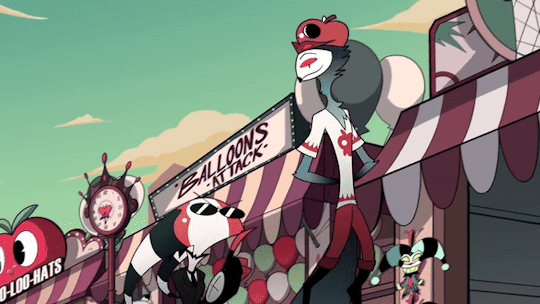
Blitz and Stolas are respectively the protagonist and the deuteragonist of the series, as the first two episodes show:
Episode 1 showcases HB's dark comedy side and focuses on Blitz's family. As a matter of fact the whole episode comically juxtaposes the Demon Murder Family with the Human Murder Family. It also illustrates how Blitz's business works.
Episode 2 showcases HB's strong character and psychological focus and it explores Stolas's family. As a matter of fact the episode is dedicated to Stolas and Via's relationship, while introducing also Stella and the Goetia in general.
Blitz and Stolas are two sides of the same coin, both when it comes to their personal arcs and to their social roles.
Personal arcs
Blitz is full of relationships and of people who love him and that he pushes away. Stolas has instead very few relationships, that are mostly bad. However, he is scared to cut them because he fears loneliness more than anything. As a result:
Blitz's arc is about reconciling with all the people he hurt or lost (Fizzarolli, Verosika, probably Barbie Wire). All while trying to be a better friend and family member for those bonds he still has (Moxxie, Loona). He must build his own family (by repairing his broken one)
Stolas's arc is about claiming his freedom back, even if it means to go against social expectations, to lose his privilege or even to unwillingly hurt Via, his most precious bond. He must escape his own family (to build a new one)
Social roles
Blitz is an Imp, while Stolas is a Goetia. However, neither fits with what society expects from them. Blitz runs his own business and shows no respect for higher demons. Stolas is in love with an imp and asks for a divorce. Both are oddballs, who are disliked by their peers, but find company in each other. This is why throughout season 1, they end up saving each other:
Blitz saves Stolas from Striker in the Harvest Moon Festival
Stolas saves Blitz from the Dhorks in Truth Seekers
They do so cause deep down they care for each other. However, they still hide their feelings behind utilitarianism and classism:
Blitz insists he is only saving Stolas because he needs his book:
Blitzo: Yeaaaaah. Well, I'm not a fan of someone I offered a job to about to off my easiest lengthy ticket to Earth behind my back.
Moreover, he deep down sees Stolas as unkillable, so he does not warn him that a killer is after him.
Stolas starts a rant on how Blitz should be more careful with the book as to not cause problems for Stolas:
Stolas: How the FUCK... did you get caught by humans?! Are you little creatures not being careful up here?! You know, if you get in trouble, I get in trouble! WE... don't want that!
Moreover, his display of power impresses Blitz and strengthens his inferiority complex.
So, both Blitz and Stolas have the potential to care for each other and to help each ohter find the family they long for. However, they are still slaves to their flaws in season 1. That is why they receive two important call-outs.
OZZIE'S AND THE FULL MOON
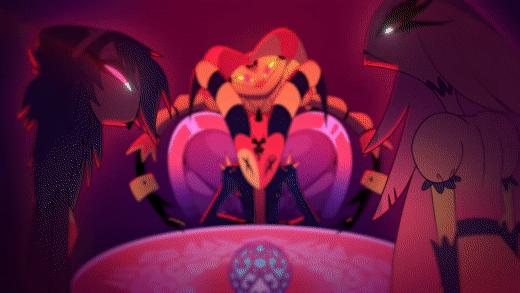
Ozzie's and The Full Moon are where Blitz and Stolas are called out on their flaws. These episodes highlight both demons still have work to do on themselves and the way they approach relationships. However, the first episode's call out is mostly about Stolas. The second episode's call out is instead mostly about Blitz.
Ozzie's
Ozzie's highlights Stolitz's problems:
[Fizzarolli] Is that Blitzø? So you're showing your face? Hey everybody, this guy's a total disgrace! Some nerve you got to comment on a relationship Last I checked, your love life is a pile of shit! [Verosika & Crowd] Oh, Blitzø? I used to date him (date him, date him) [Blitzø] Oh Verosika, you are here [Verosika & Crowd] I'd stroke and I'd fellate him (fellate him, fellate him) Yeah, but when it was my turn (my turn, my turn) He did no reciprocatin' (what a dick-bag) A selfish imp in the sheets And just as bad in the streets A reckless, heartbreaking freak! [Asmodeus] Who's that at your table? Is your date a demon prince? Stolas, is that you? [Wally Wackford] Are you sleeping with an imp?! [Asmodeus] Wooo! My dark lord, how the mighty do fall You used to have a smoking wife, a kid, you had it all! I hope you didn't give it up so you and him could get it up You sold your life for a thrust Now, that's the spirit of lust
And makes clear what they want:
[Millie] I think you were trying to sing something for me, Mox [Moxxie] Yeah, I was I love us I love us just the way we are Don't have to pretend to like to do things we don't I've always got you around to laugh at my stupid jokes I'll never take you for granted I'll always give you my best And if you can offer the same thing Fate will handle the rest 'Cause I love you 'Cause I love you
They want a relationship like the one Millie and Moxxie have, but they can't because differently from the two Imps they aren't honest with themselves.
On the one hand Blitz keeps self-sabotaging his relationships. The moment they become serious he ghosts the other or hurts them, so that they fall out. His inability to honestly express his feelings is literally at the root of the most tragic event of his past:
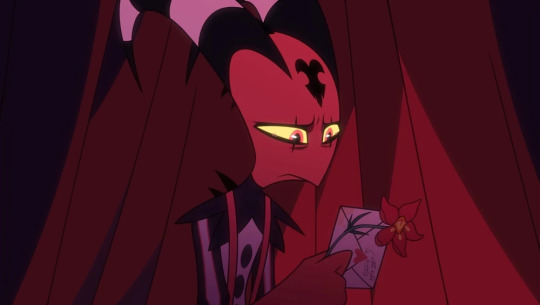
Blitz's self-hate makes it impossible for him to confess to Fizz, which in turns causes the fire.
On the other hand Stolas is indecisive on what he wants. He wants to belong with someone and has feelings for Blitz. However, he does not act on them and uses the deal they stroke to save appearences with the Goetias. In fact, he is still very clearly concerned of what other people think. He is especially worried of destroying his family and hurting Octavia:
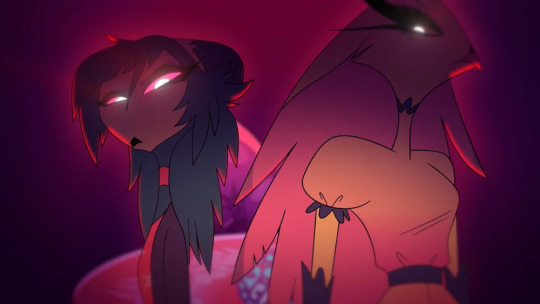
Both characters are flawed, but Stolas is the one who receives the biggest call out:
Blitzo: Stolas, don't act like what we have is anything but you wanting me to fuck you, okay? You make that really clear all the time. But, I just, I-I can't do it tonight, okay?
Blitz's speech opens Stolas's eyes to the point he starts to change. He finally asks Stella for a divorce, he gives Blitz more space and eventually decides to cancel their deal. All so that Blitz can choose freely if to stay with Stolas or not.
Blitz too grows, but his development is slower and more reactive. He mends things with Fizz, but he succeeds because the two find themselves in a dangerous situation outside of their control. Blitz still fails to connect with Barbie. Finally, he keeps being dismissive of Stolas, despite having clear feelings for him:
Blitzo: Stolas got what? How?... He can get hurt?
The Full Moon/Apology Tour
The Full Moon has the characters being on completely different pages:
Stolas: When I see him Blitzo: When I see him, I'm gonna do that thing he likes Stolas: I will change things Blitzo: No need to change things I'll just bring the rope and spikes Stolas: Oh God! Blitzo: We've got a nice arrangement and it's working out just fine We'll keep it light Stolas: I'll fucking die alone if this goes bad! Both: When I see him tonight
Stolas has developed to the point, where he wants the relationship with Blitz to either become a real one or to end. Blitz instead is fine to keep things as they are. In this way he gets to have a relationship, but doesn't really have to put in any effort.
This incompatibility explodes in their discussion, where:
Stolas conveys his feelings clearly enough, but is too self-focused on his own hurt to give Blitz any time to properly express his. Blitz's first and bad reaction is all Stolas decides to listen to. The moment Blitz confusely tries to reach to him, he dismisses him and only pays attention to Blitz's angry rant. If he were not too focused on imagining Blitz as this perfect knight in shining armor, he could have noticed the imp's confusion, vulnerability and desperation to keep the relationship going.
Blitz fails to understand both Stolas's genuine emotions and his own. That is why he is unable to give Stolas a proper answer. He himself is not sure, but instead of admitting it he makes sex jokes and tries to make their bond all about physical intercourse. He can neither understand feelings, nor communicate them. Moreover, the moment he is misunderstood he lashes out instead of trying to explain himself better.
As Blitz is the one who grew up the least, he is given the biggest call-out between the two. He is invited to a very special Anti-Blitzo Party, where he is forced to see first-hand how many people he hurt. There he is forced to face not only Stolas, but all his exes, Verosika and most importantly himself:
Blitzo: No. You're right. I actually am, ya' know... sorry. I-I don't want to be this way. Not forever.
Blitz reconciles with Verosika and will probably start to fix his flaws in the upcoming episodes. Like Stolas did after Ozzie's.
There is another interesting difference between Ozzie's and The Full Moon, though. Ozzie's outcome is explored in two different episodes, one dedicated to Blitz (Queen Bee) and the other to Stolas (The Circus). The two characters are both messed up after their first real date, but they go through their pain alone. The Full Moon's outcome is instead explored in Apology Tour, where the two characters face the pain of their break-up together. In a sense, it is only after their first fight they can really look at each other as two real people, instead than ideals.
BREAK UP THE (I)DEAL
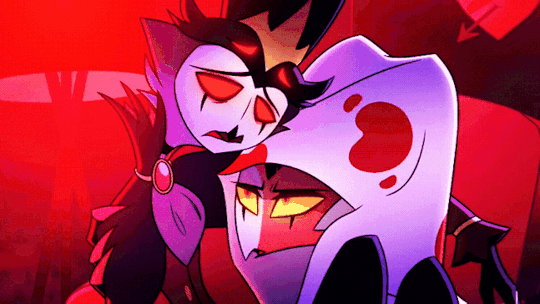
Blitz sees Stolas as a powerful, cold and selfish Goetian Prince. Stolas instead sees Blitz as a wonderful Knight in Shining Armor. Both see the other as some kind of idealistic version of themselves. Either 100% negative or 100% positive. They ignore each other's feelings and struggles. That is why their first honest confrontation degenerates into a fight. If they knew each other better, they could have understood each other.
That is why it is only after they break up, that ironically they can treat each other as real people, as it happens in Apology Tour.
Both are able to properly express themselves freely. Stolas breaks his thirsy bird mask and shows how lonely and sad he is. Blitz breaks his self-assured asshole persona and says how vulnerable a real relationship with another makes him feel. Both are finally able to be themselves and to show themselves to the other.
However, they still have a long way to go before they can rekindle their relationship:
-Blitz is imo the one bound to grow the most from this altercation. He was called out directly on the things he did wrong and has finally to try and fix his attitude towards others. Something the narrative has made very clear he must do, not only when it comes to his romantic bonds, but to his platonic ones, as well.
-Stolas knows he messed up, but he is probably still struggling to see what exactly he did wrong:
Stolas: But maybe it's all on me For missing every sign and every glance and every turn Maybe there's something here for us to glean For you to teach and me to try and learn
Still, he is bound to soon receive some consequences. After all, he risked it all on his relationship with Blitz, only to find himself as lonely as ever. He is in the middle of a divorce, which will probably end badly for him. His relationship with his daughter is in danger and I would not be surprised if he were to lose his status as a Goetia soon.
In general, I am expecting the climax of the season being Blitz and Stolas risking to lose everything (their businesses, their families), but finding an ally in each other. Once again.
#helluva boss#helluva boss meta#blitzø#stolas#stolitz#hellaverse#hb meta#my meta#asksfullofsugar#anonymous
54 notes
·
View notes